DashClicks Blog
The industry's top experts offer their best advice, research, how-tos, and insights—all in the name of helping you level-up your business and online marketing skills.
Join Us!

How Agencies Use White Label Facebook Ads to Improve Client CTR
Click-through rate, or CTR, remains one of the most telling performance signals in Facebook advertising. It measures how often people click an ad after seeing it, calculated by dividing clicks by impressions. While it is not the final measure of success, CTR is often the first clear indicator of whether an ad is relevant, engaging, and aligned with audience intent. When CTR is healthy, it usually points to strong targeting, compelling creative, and efficient delivery within Meta’s ad auction.
Recent industry data shows that average CTRs on Facebook have improved as advertisers refine their strategies. Traffic campaigns often see CTRs around 1.6% to 1.8%, while lead generation campaigns frequently reach 2.5% or higher. Well-optimized campaigns with strong creative and audience alignment can push beyond the 3 percent mark. These numbers matter because higher CTRs often lead to lower cost per click, better quality scores, and more efficient budget use.
For agencies, however, maintaining or improving CTR across many client accounts is not easy. Audience fatigue, creative burnout, and constant platform updates can quickly drag performance down. When teams are stretched thin, CTR often becomes reactive rather than strategic. This is where white label Facebook ads services play a valuable role. By tapping into specialized expertise, agencies can improve CTR consistently while focusing on client relationships and growth.
Why Agencies Struggle to Sustain High CTR?
1. Targeting Complexity and Platform Shifts
Facebook’s targeting capabilities are powerful, but they have also become increasingly complex over time. Audiences evolve quickly, competition grows across nearly every industry, and privacy-focused updates have changed how user data is tracked and leveraged. Interest-based targeting that once delivered strong results can lose effectiveness as the same users are repeatedly targeted by multiple advertisers. As audience fatigue sets in, click-through rate naturally declines.
At the same time, Meta’s algorithm continues to shift toward signals that reflect genuine engagement and relevance. Ads are rewarded when they resonate with users, not simply when they reach a broad audience. This places more pressure on agencies to refine their targeting strategies continuously.
Many agencies, however, rely on broad audiences or outdated structures because they lack the time or resources to revisit targeting regularly. Ads may reach users who fit basic criteria but are not actively interested or ready to engage. As a result, CTR drops, costs rise, and campaigns require more spend to maintain performance. Modern targeting is no longer just about who sees the ad. It is about how the target audience is segmented, how they move through different stages of awareness, and how messaging aligns with intent at each step.
2. Creative Bottlenecks
Creative is one of the strongest drivers of CTR, yet it is also one of the most difficult areas for agencies to scale. Producing fresh visuals, compelling copy, and attention-grabbing hooks on a consistent basis demands time, creative talent, and a clear testing process. When teams are stretched thin, creative refresh cycles slow down.
Many agencies reuse the same ads for extended periods, which leads to creative fatigue. Users see the same visuals repeatedly and stop paying attention, even if the targeting is accurate. Engagement declines, organic click-through rate drops, and performance suffers.
Without a structured testing framework, agencies often rely on assumptions instead of data. They may test only one or two variations rather than experimenting with different hooks, formats, headlines, and visual styles. When creative testing becomes limited or inconsistent, opportunities to improve CTR are missed. Over time, performance plateaus or trends downward simply because the creative is no longer keeping pace with audience expectations.
3. Ad Placement and Format Complexity
Facebook and Instagram provide a wide range of ad placements, including feeds, stories, reels, in-stream placements, and the audience network. Each placement attracts users with different behaviors and content expectations. What works well in the feed may perform poorly in stories, and vice versa.
Short-form video placements such as Instagram Stories and Reels often generate higher engagement because they feel more native and immersive, particularly for mobile users. Feed placements, while valuable for reach, may require different creative approaches to earn clicks.
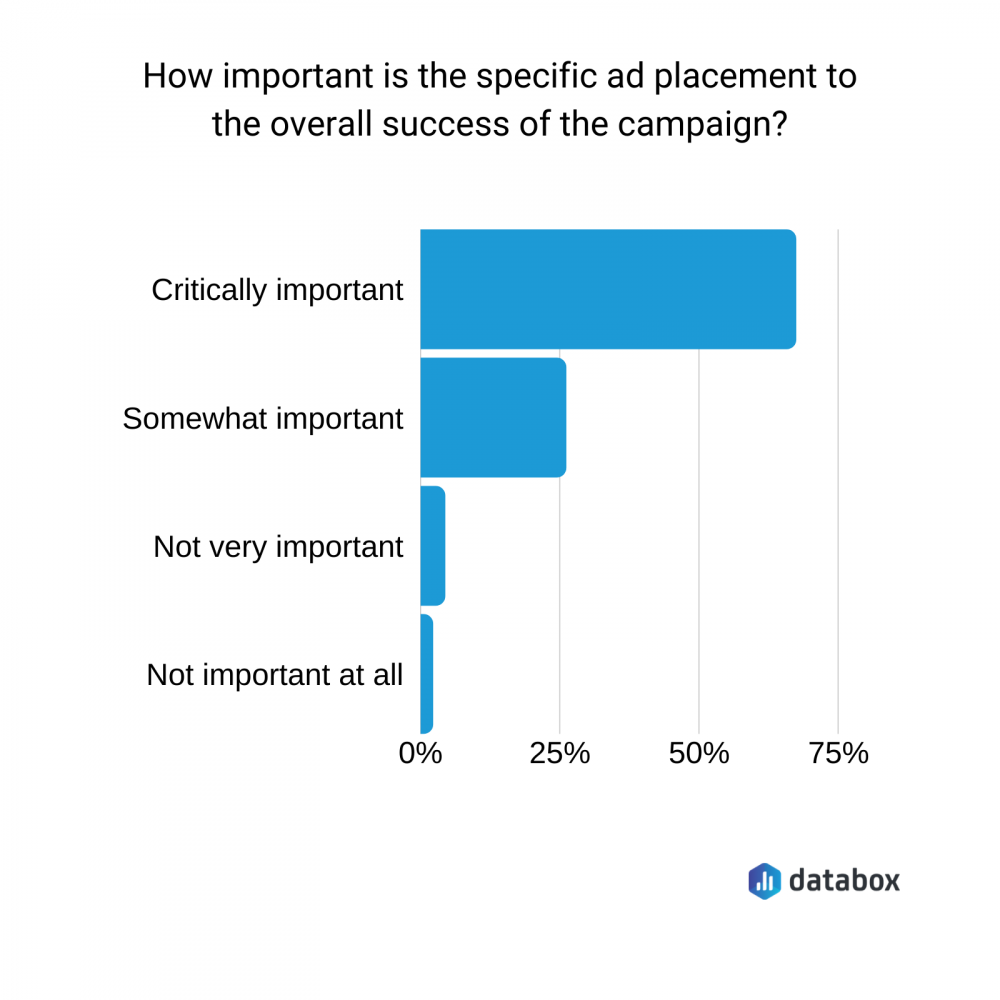
Image Source: Databox
Many agencies rely heavily on automatic placements without closely reviewing placement-level performance. While automation can save time, it can also dilute CTR if budget flows into placements that consistently underperform. Effective placement optimization requires ongoing analysis, creative adjustments by format, and strategic budget allocation. This level of detail is often overlooked by generalist teams managing multiple accounts.
4. Reporting Challenges
CTR can also become a source of confusion when it is misunderstood or misreported. Some reports focus on total clicks instead of link clicks, which inflates numbers without reflecting meaningful engagement. This can lead to poor optimization decisions and unrealistic client expectations.
When agencies struggle to explain why CTR has changed or how it connects to broader campaign performance, trust can erode. Clients may feel uncertain about the strategy or question whether campaigns are being actively managed.
Taken together, these challenges can make agencies appear reactive rather than strategic. White label Facebook advertising partners help address these issues by bringing focused expertise, proven frameworks, and clear reporting structures. This allows agencies to present stronger performance narratives, improve CTR consistently, and maintain client confidence over time.
How White Label Facebook Ads Improve Client CTR?
Targeting remains one of the most powerful levers for improving CTR. When ads are shown to people who are both relevant and ready to engage, clicks happen more naturally. White label partners focus heavily on audience strategy because CTR improves fastest when intent and messaging are properly aligned.
A. White Label Techniques That Improve CTR:
Advanced audience segmentation is usually the first step. Instead of relying on a single broad audience, white label teams break audiences into smaller, well-defined groups based on interests, behaviors, and previous interactions. For instance, a cold audience may be divided into micro-segments that combine interest categories with recent online behaviors, such as content engagement or shopping activity. Each segment receives messaging that speaks directly to its context, which increases relevance and encourages more clicks.
1. Progressive sequencing adds another layer of refinement. Rather than asking for a click right away, white label teams often warm users through video views, page engagement, or social interactions. Someone who has watched part of a video or interacted with a post is far more likely to click a follow-up ad. Retargeting these warmed users with clear, click-focused messaging builds familiarity and trust, which consistently leads to higher CTR than targeting cold audiences alone.
2. Lookalike and custom audiences are also optimized using higher-intent data sources. Instead of building lookalikes from basic actions like page views or ad reach, white label specialists focus on conversion-based signals such as initiating checkout, lead form submissions, or completed purchases. These audiences more closely resemble users who are inclined to take action, which improves click engagement and overall campaign efficiency.
3. Retargeting and funnel-aware optimization further strengthen CTR performance. Retargeted users already recognize the brand, making them more comfortable engaging with ads. Industry benchmarks often show retargeting CTRs that are two to three times higher than those of cold audiences. White label teams design structured funnels that guide users from awareness to consideration and finally to action, maintaining strong CTR at every stage instead of relying on a single campaign approach.
Once the right audiences are in place, the focus shifts to giving users a compelling reason to click. This is where creative strategy plays a decisive role.
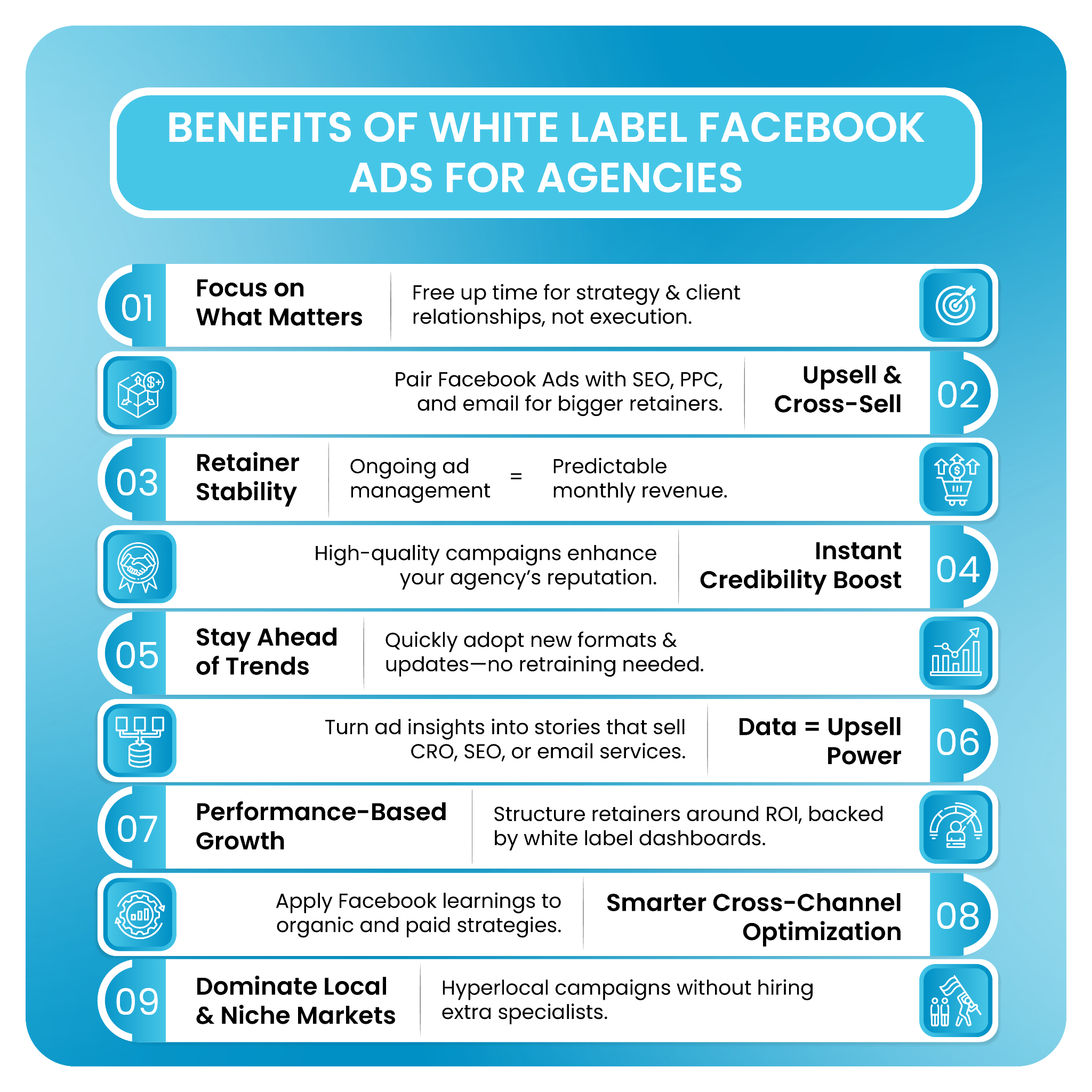
B. Creative Testing and Optimization
Even the most refined targeting will struggle without strong creative. The best white label Facebook ads services treat creative as an ongoing process rather than a one-time setup, allowing CTR to improve over time instead of peaking early.
White Label Creative Tactics That Boost CTR:
1. Systematic A/B testing sits at the center of this approach. Multiple variations are tested at once, including different hooks, visuals, headlines, and formats. Hooks may highlight a common problem, a clear outcome, curiosity, authority, or social proof. By testing five to ten variations at a time, white label teams can quickly identify which combinations drive the strongest CTR and scale them efficiently.
2. Data-driven decisions replace guesswork throughout the process. Metrics such as thumb-stop rate, CTR by creative, and engagement signals help guide optimization. Dynamic creative tools allow Meta to automatically pair the strongest elements together, improving performance as the algorithm learns which combinations resonate most with each audience.
3. User-generated and native-style creative has proven especially effective in driving clicks. Ads that resemble organic content tend to feel more authentic and less disruptive. In several industries, studies have shown that user-generated style ads can lift CTR by more than 20% compared to highly polished brand visuals.
4. Placement-aware creative ensures that ads feel natural wherever they appear. Vertical videos with clear opening hooks perform better in Stories and Reels, while feed placements can support longer copy and more detailed messaging. White label teams design creative specifically for each placement, which helps maintain consistent CTR across the entire campaign.
5. Iterative optimization keeps performance from stalling. Creative is refreshed every five to seven days to avoid fatigue and keep audiences engaged. In many cases, white label partners have achieved CTR improvements of 15 to 30% by shifting from static images to short-form vertical video with strong opening messages.
With targeting and creative aligned, the final step is ensuring ads appear in the right places and under the right conditions.
C. Ad Placement and Optimization
Ad placement has a direct impact on how users interact with Facebook and Instagram ads. White label teams closely monitor placement-level performance to ensure ads are delivered where they generate the most engagement.
White Label Optimization Tactics:
1. Feed, Stories, and Reels strategies are tailored to campaign goals. Feed placements offer scale and consistency, while Stories and Reels often deliver higher CTR due to their immersive, mobile-first experience. Short-form video placements have become particularly effective as user behavior shifts toward quick, scroll-friendly content.
2. Device optimization is another critical factor. Since the majority of Facebook traffic comes from mobile devices, white label teams design ads with mobile users in mind. Clear calls to action, readable text, and fast-loading landing pages all contribute to stronger CTR on smaller screens.
3. Placement exclusion and budget prioritization help eliminate wasted spend. Low-performing placements, such as certain audience network positions, may be excluded altogether. Budget is then redirected toward placements that consistently produce higher CTR, improving engagement without increasing overall spend.
4. Objective alignment also plays an important role. Lead generation campaigns often achieve higher CTR than traffic campaigns because users expect to take action directly within the platform. White label Facebook advertising experts select objectives that support both strong click engagement and meaningful downstream results.
5. Campaign structure optimization ties everything together. Separating campaigns into cold, warm, and retargeting stages allows each segment to be optimized independently. Agencies working with white label partners often see noticeable CTR gains after restructuring campaigns this way, as each audience receives the right message, in the right format, at the right time.
How DashClicks Helps Agencies Improve Client CTR?
DashClicks supports agencies by providing structured, expert-driven white label Facebook advertising designed to improve engagement and CTR. Their approach focuses on the core elements that influence click performance, including audience strategy, creative testing, and placement optimization.
The platform builds refined audience frameworks that separate cold, warm, and retargeting users. This ensures ads are shown to people based on their readiness to engage, which naturally improves CTR. Their team continuously tests creative elements such as hooks, visuals, and formats to identify what resonates most with each audience segment.
Placement optimization is another key strength. Their team reviews performance across feeds, stories, and reels, adjusting budgets toward placements that deliver stronger click engagement. Agencies receive white-labeled reports that clearly highlight CTR trends, creative performance, and optimization actions, making it easier to communicate value to clients.
By handling execution and optimization, DashClicks allows agencies to deliver consistent results through best white label Facebook ads practices while maintaining full control over client relationships.
Conclusion
Improving CTR on Facebook is not about quick fixes. It requires thoughtful targeting, continuous creative testing, and smart placement decisions. As competition increases and user behavior shifts, agencies need specialized systems to maintain strong engagement across accounts.
White label Facebook ads services give agencies access to focused expertise without adding internal strain. By partnering with teams that understand audience segmentation, creative performance, and platform nuances, agencies can present clearer strategies and stronger results to clients.
Agencies looking to improve CTR should start by auditing current performance against industry benchmarks. Setting realistic goals, often between 1.8 and 3 percent depending on campaign type, creates a clear direction. From there, structured targeting, regular creative testing, and weekly optimization cadences help sustain progress.

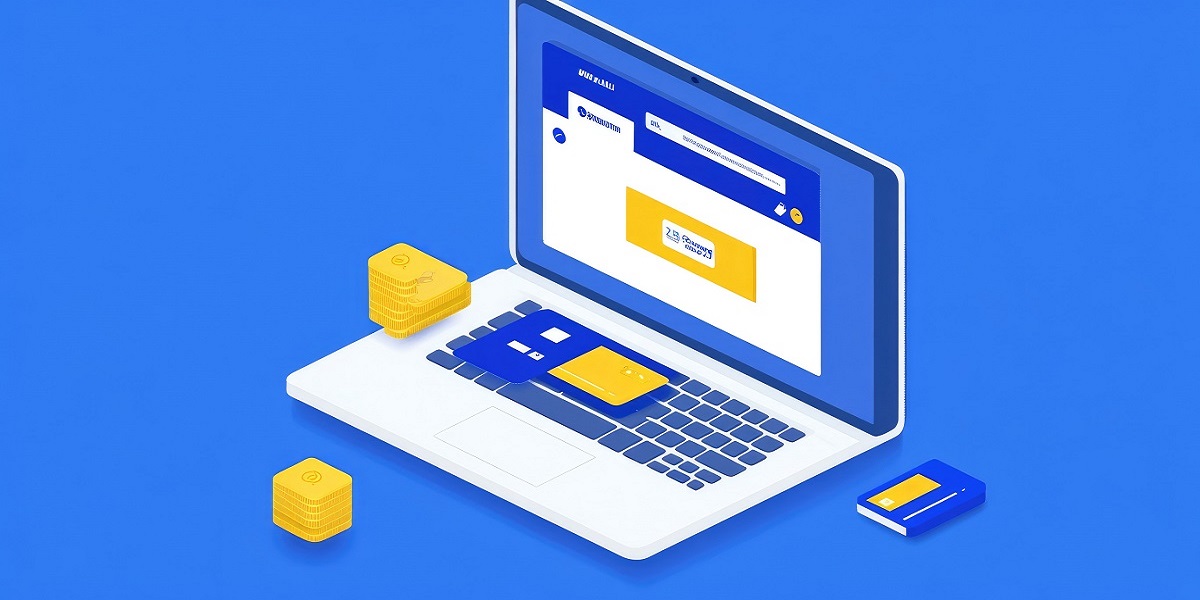
User-Friendly eCommerce Website: Cost, UX Trends, And Must-Have Features
A user-friendly eCommerce website isn’t just polished design—it’s the shortest path from first click → confident purchase → repeat customer. For MotoCMS readers (store owners, marketers, and SMB teams), the real decision usually comes down to this: launch fast with a template/site builder, or invest in custom development.
This guide breaks down what makes an online store genuinely easy to use: the UX trends shaping expectations today, the build mistakes that quietly hurt conversion, the non-negotiable features to prioritize, and the cost drivers you should plan for.
How Much Does a User-Friendly eCommerce Website Cost? (What Drives Price)
1. Hosted Builder vs. Self-Hosted eCommerce Site
The tradeoff is clear:
- Self-hosted offers more control, but you own maintenance, security, and ongoing development cost.
- Hosted reduces operational burden and can be ideal when speed-to-market matters.
Your best choice depends on internal resources, risk tolerance, and how quickly you need to ship.
2. Template-Based Launch vs. Custom eCommerce Development
- Templates help you launch faster with proven layouts and fewer UX mistakes.
- Custom development makes sense when you need unique purchase flows, deep integrations, or advanced performance work.
If you’re running (or moving toward) a Magento storefront and want a lighter, performance-focused front end, partnering with a Hyva theme development company can be a practical path to faster UX without rebuilding your entire stack.
3. Cost Drivers to Plan For
You don’t need a single “average cost” number to budget well. You need to understand what expands scope:
- Platform and hosting model (hosted vs. self-hosted responsibilities)
- Design complexity (template tweaks vs. custom components)
- Feature scope (filters, reviews, automations, multichannel feeds)
- Security and compliance (PCI, fraud tools, backups)
- Ongoing maintenance (updates, speed optimization, SEO/content)
4. Suggested Budget Tiers (Described, Not Priced)
- Starter MVP: browse-first taxonomy, strong PDPs, basic checkout/shipping, analytics
- Growth store: advanced filters, reviews/Q&A, automations, multichannel feeds
- Advanced: custom theme/performance engineering, integrations, scalable infrastructure, robust search (often via a third-party service)
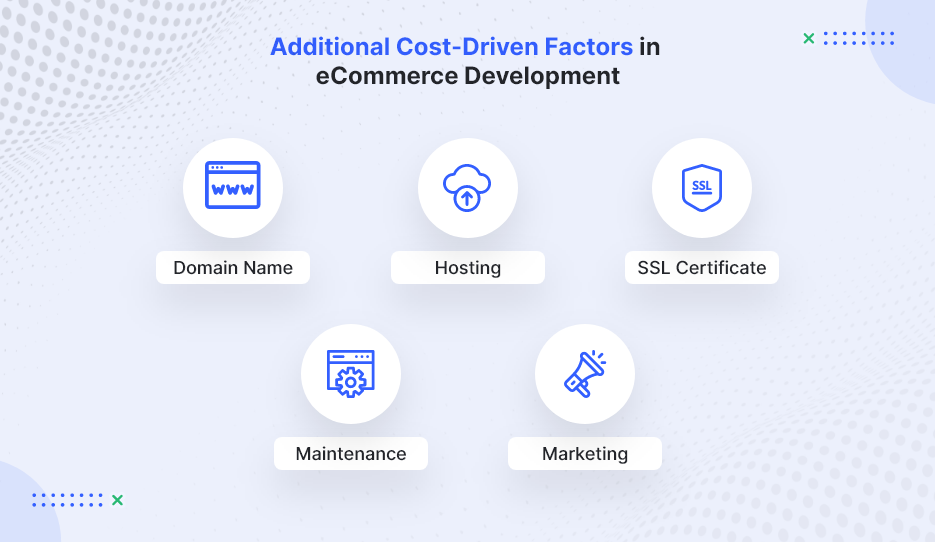
Image Source: WebMob
Start With the User: Audience Research That Shapes eCommerce UX
1. Define Your Audience, Products, and Goals Before Design
A practical way to prevent “pretty but hard to buy from” stores is to start with a simple chain: persona → UX decision. For example, if you sell quick meal solutions to busy professionals, your eCommerce UX should prioritize fast navigation, highlight prep time, and reduce checkout friction. To make this actionable, document:
- Top 3 customer goals (e.g., “find the right item fast,” “confirm delivery date,” “trust returns”)
- Top objections (price, fit/compatibility, shipping cost, legitimacy)
- Most common browsing pattern (category discovery vs. SKU search)
2. Build Browsing First (Especially for Small Catalogs)
A recurring lesson from early-stage marketplaces is that browsing often beats search when shoppers are exploring and don’t know what to type yet. For smaller, discovery-driven catalogs, a browsing-first experience can outperform search because it guides people toward decisions instead of asking them to already know what they want. Prioritize:
- Clear categories and collections
- Curated “new,” “best sellers,” and “giftable” paths
- Strong merchandising modules (related items, bundles, “complete the set”)
3. Taxonomy Is the Backbone of a User-Friendly Online Store
Your category structure isn’t a one-time menu decision—it’s a product that needs iteration. Teams regularly need multiple rounds of re-categorization before customers find it intuitive.
Practical taxonomy rules:
- Keep depth reasonable (avoid burying products under 5+ clicks)
- Add “shop by use case” paths (problem solved, recipient, compatibility)
- Use customer language—not internal jargon
- Validate labels with real shoppers (what they call it matters most)
eCommerce UX Trends That Make Stores Feel Effortless Right Now
1. Mobile-First eCommerce UX (Responsive by Default)
Mobile-first is no longer a trend—it’s the baseline. Responsive layouts should adapt naturally across devices, but “mobile-friendly” also means you design for thumbs and limited attention. Focus on:
- Thumb-friendly navigation and tap targets
- Fast-loading product detail pages (PDPs)
- Minimal checkout steps and fewer form fields
2. Site Speed and Reliability Are UX Features
Performance affects trust and conversion. Downtime loses sales, and slow pages increase bounce rate—plus poor speed can harm organic visibility. Treat performance like core UX:
- Compress images and avoid heavy scripts/apps
- Use a quality host and CDN when applicable
- Monitor uptime and page speed continuously (not only at launch)
3. Smarter Discovery: Browse + Filters, Then Efficient Search
A modern discovery roadmap tends to look like this:
- Nail taxonomy and browsing
- Add filters/sorting as the catalog grows
- Introduce search when complexity demands it
When search becomes necessary, many stores use third-party search services/APIs to reduce engineering time and avoid maintaining a full indexing stack in-house.
Core Features of a User-Friendly eCommerce Website (Non-Negotiables)
1. Navigation That Matches How People Shop
Navigation should reflect customer intent, not your org chart. Strong eCommerce navigation typically includes:
- Clear categories, breadcrumbs, and on-site pathways between products
- Sorting (price, popularity, newest)
- Filters (availability, size, rating, shipping speed)
If your platform supports it, add “related items” and “frequently bought together” to reduce dead ends and increase cart confidence.
2. Product Pages (PDPs) That Convert Without Friction
High-performing product pages reduce hesitation by answering questions early:
- Clear pricing, variants, and stock status
- Shipping and returns visibility before checkout
- Reviews, trust signals, and high-quality images/video
- Size guides/compatibility notes where relevant
3. Payments, Security, and Trust UX
Security is non-negotiable, but trust is also a UX problem. Customers need clarity and reassurance throughout checkout. Prioritize:
- Fraud prevention, backups, and proper payment security standards (e.g., PCI compliance for card processing)
- Transparent totals (shipping, taxes, fees) before the final step
- Clear confirmation emails and an easy refund/returns workflow
4. Shipping and Delivery UX
Shipping is part of the product experience. Make it easy to understand and hard to misinterpret:
- Delivery estimates, tracking, and local pickup (if relevant)
- Clear rules (free-shipping thresholds, regions, handling time)
- Upfront information on returns and exchanges
5. Back-Office Tools That Prevent Customer Pain
Operational issues quickly become common UX issues. Inventory errors, delayed fulfillment, and inconsistent listings create support tickets and lost trust.
Look for strong tools for:
- Inventory and order management
- Fulfillment workflows
- Promotions and email automation
- Multichannel selling readiness (marketplaces/social)
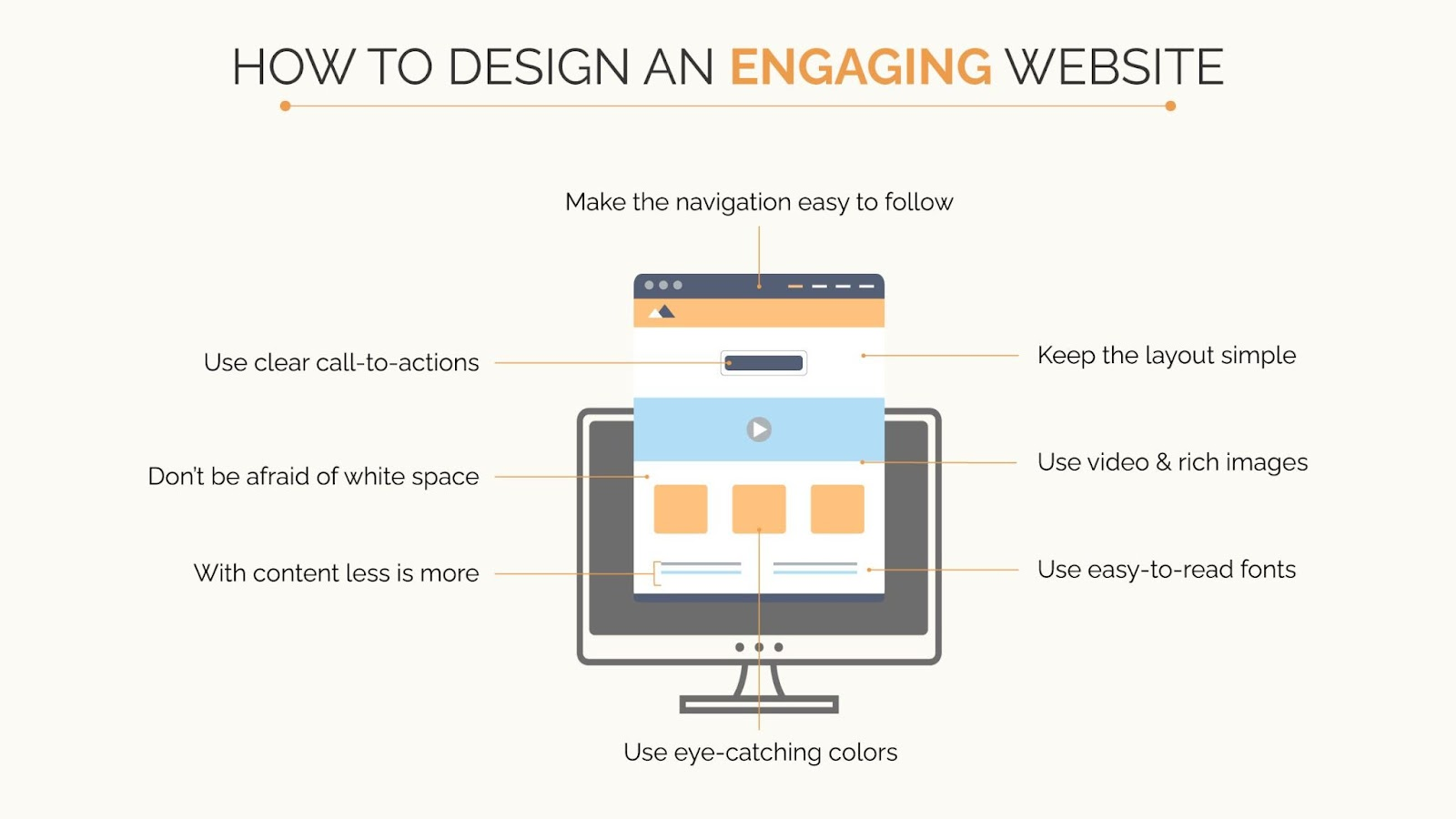
Biggest eCommerce UX Challenges (and How to Avoid Them)
1. Competing With Giants: Why Niche Stores Win on UX
Competing head-to-head with Amazon-style convenience is difficult. Niche stores win by offering a better decision experience:
- Specialized categories that match how buyers think
- Expert guidance, comparisons, and bundles
- Content that answers specific buyer questions (compatibility, sizing, use cases)
2. Overbuilding Too Early (Feature Bloat)
A common conversion killer is building complex features before you’ve validated customer behavior. Start with the smallest UX strategy that supports the core job: find → evaluate → purchase → receive.
What to do instead:
- Instrument key actions (PDP views, add-to-cart, checkout start, checkout completion)
- Improve the biggest drop-off point first
- Scale features only when customers prove they need them
3. Performance Issues (Speed + Hosting)
Speed problems often come from “death by a thousand add-ons.” Keep the stack lean and measure the impact of every extra script and widget.
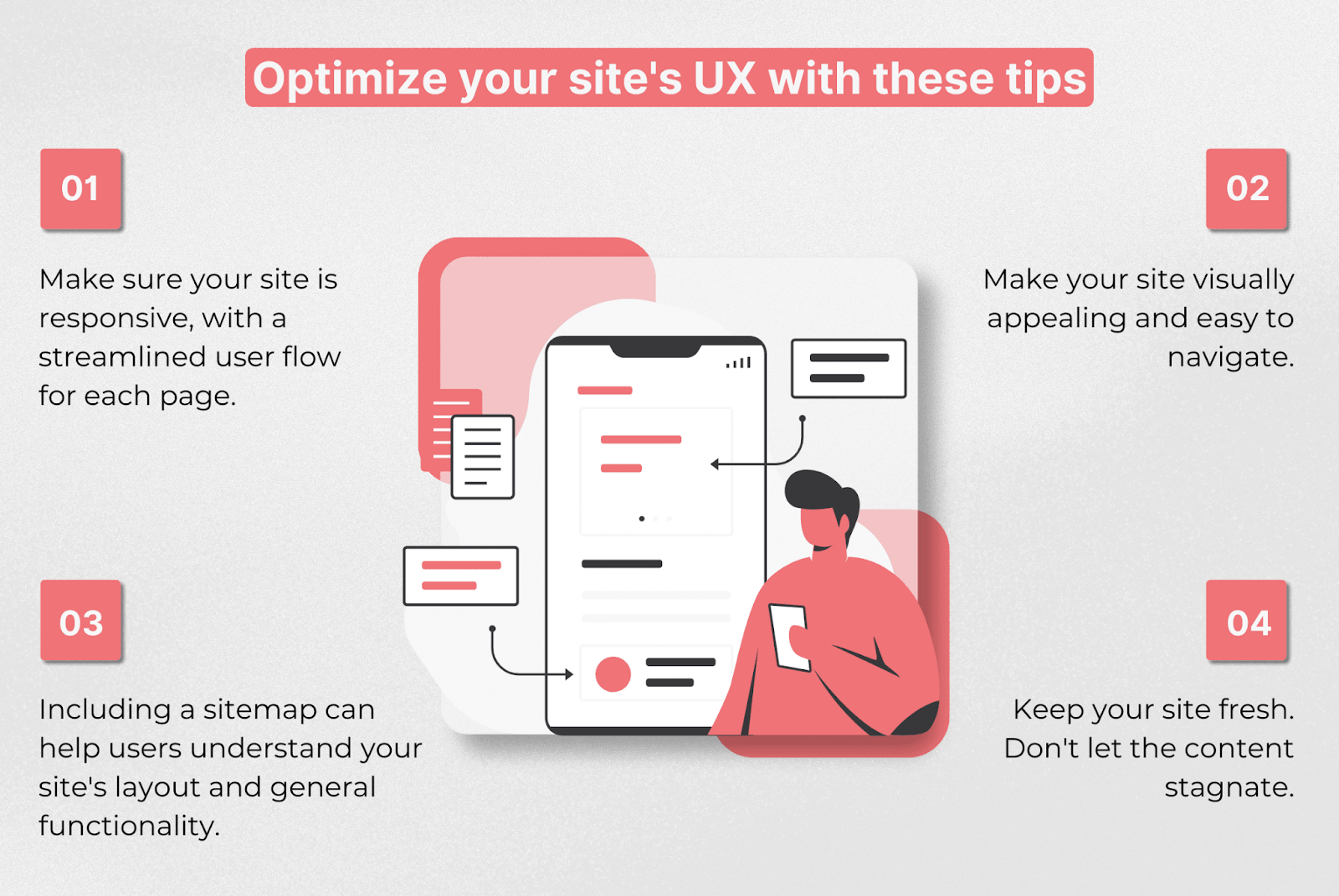
How a Website Builder Software Helps Reduce eCommerce Complexity?
For many SMB teams, the biggest challenge isn’t choosing features, it’s managing the technical overhead behind them. Hosting setup, theme compatibility, plugin conflicts, performance optimization, analytics tools, and SEO integrations can quickly turn a simple store into a complicated stack.
This is where modern website builder software can help. Instead of assembling multiple tools, builders typically bundle core capabilities into one system, including:
- Hosting and infrastructure management
- Responsive templates optimized for eCommerce
- Built-in SEO settings and analytics tracking
- Drag-and-drop editing for faster page updates
- Security updates, backups, and performance monitoring
For smaller teams or first-time store owners, this reduces the need for ongoing developer support and shortens the time between idea and launch. It also makes it easier to test merchandising layouts, update product pages, and iterate on UX without rebuilding parts of the site.
Website builder software are often most useful when:
- Speed-to-launch matters more than deep customization
- The catalog is small to medium in size
- The team lacks in-house technical resources
- Ongoing maintainability is a priority
They may be less suitable for stores that require highly specialized integrations or complex backend workflows. But for many SMBs, a builder platform provides a practical middle ground between rigid templates and full custom development.
Reducing Technical Overhead with Unified Website Platform
For SMB teams that want to avoid stitching together hosting, design tools, plugins, analytics, and marketing integrations, all-in-one website ecosystems are becoming a practical alternative to traditional builds.
DashClicks’ Sites platform is one example of this approach. It combines a drag-and-drop website builder software, responsive templates, built-in eCommerce functionality, and integrated SEO tools in a single dashboard. Instead of managing multiple vendors for hosting, site edits, and optimization, teams can handle updates, product pages, and performance tracking from one place.
This kind of setup can be particularly useful when speed-to-launch and maintainability matter more than deep customization. For smaller catalogs or growing online stores, the ability to adjust layouts, add pages, and optimize content without developer support can reduce ongoing costs and allow faster iteration.
Platforms like this are typically best suited for:
- Small to mid-sized stores that need to launch quickly
- Teams without in-house developers
- Agencies managing multiple client websites
- Businesses that want built-in SEO and analytics rather than separate tools
They may be less ideal for stores requiring highly custom checkout flows, complex backend integrations, or unique front-end functionality, where custom development still provides more flexibility.
For many SMBs, though, DashClicks can offer a middle ground between rigid templates and fully custom builds, helping them launch faster while keeping their site easier to maintain over time.
Conclusion
A user-friendly eCommerce website is built, not decorated. The reliable formula is: audience research → strong taxonomy and browsing → trust and checkout fundamentals → mobile + speed → continuous iteration via feedback.
Start with the smallest set of features that makes shopping effortless, measure real behavior, and scale only what customers prove they need. That approach keeps your store fast, maintainable, and easier to market over the long term—exactly what SMB teams need to grow sustainably.
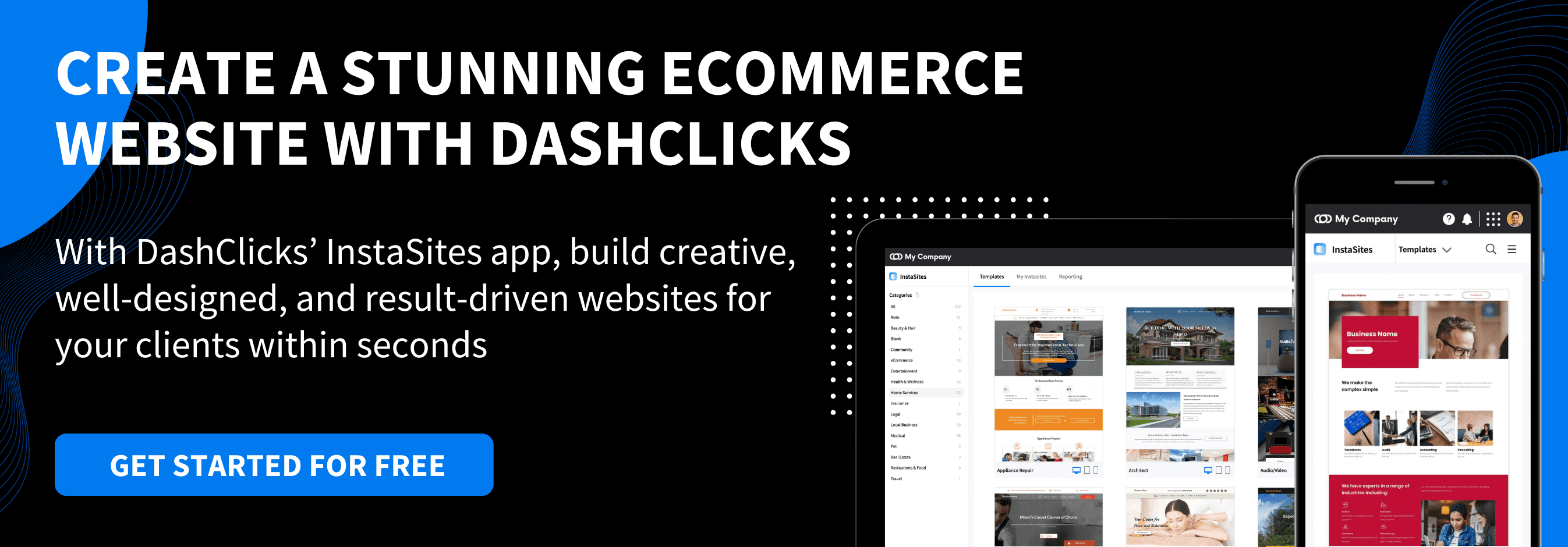

The Role of White Label SEO in Streamlining Client Reporting
For most digital agencies, client reporting is not just a monthly task. It is the moment where trust is either reinforced or quietly weakened. Reports are where strategy meets proof. They show whether the work being done is moving the needle or just creating noise. According to a 2024 survey by Databox, more than 70 percent of clients say clear reporting is the main factor that shapes their confidence in an agency. That makes reporting a business-critical function, not a simple deliverable.
Yet many agencies struggle here, even when their tools are solid. Dashboards look polished, data is available, and automation is in place. Still, reports feel confusing, inconsistent, or hard to explain. The hidden truth is that reporting problems are rarely caused by software. They are caused by execution gaps behind the scenes.
This is where white label SEO plays a deeper role than many agencies expect. It is often seen as a fulfillment shortcut, but its real value lies in operations. When SEO execution is handled by specialists using consistent processes, reporting becomes simpler, more accurate, and easier to defend. Transparency improves naturally because the data feeding the report is clean and reliable.
To understand why white label SEO has such an impact on client reporting, it helps to first look at why agency reporting breaks down in the first place.
Why Client Reporting Becomes Complex and Unreliable?
1. Reporting Complexity Is a Symptom, Not the Root Issue
Most agencies today are juggling multiple services at once. SEO, PPC, social media, CRO, content, and analytics often live under the same umbrella. On paper, this looks like a full-service offering. In practice, each service runs on its own metrics, timelines, tools, and processes. Over time, reporting becomes overloaded not because agencies want it to be, but because execution is scattered.
When work is split across internal teams, freelancers, and external vendors, there is no single source of truth. Data comes in from different platforms, updates arrive at different times, and priorities shift depending on who is working on what that month. Client Reporting grows bloated as agencies try to capture everything, even when not everything is aligned.
Account managers are usually the ones holding this together. They collect updates from multiple execution teams, interpret performance data, and attempt to turn it into a clear narrative for clients. Instead of focusing on strategy or growth conversations, they spend a large part of their time translating and reconciling information. This is where issues begin to surface.
When execution is not centralized or standardized, reporting cannot stay clean. It becomes reactive instead of structured. Reports explain what happened rather than clearly showing why it happened and what comes next. Over time, this lack of structure makes reporting feel heavier, slower, and less trustworthy.
Fragmentation also introduces a deeper problem that is harder to fix after the fact: accuracy.
2. Inconsistent SEO Execution Leads to Inconsistent Data
SEO is especially sensitive to inconsistency. Unlike paid media, where changes can be measured quickly, SEO performance builds over time and depends heavily on steady execution. When different freelancers, vendors, or junior team members handle SEO using different approaches, results become uneven.
One month may focus heavily on technical fixes. The next may prioritize content creation. The following month might shift toward link building. None of these activities are wrong on their own, but without a clear, continuous strategy, they fail to compound. KPIs start to move unpredictably because the strategy itself keeps changing.
Clients may not always understand the technical details, but they notice the pattern. Rankings improve and then stall. Traffic increases, but conversions do not follow. Reports start including longer explanations, qualifiers, and justifications. Over time, these explanations begin to sound uncertain or defensive.
HubSpot research supports this perception gap. Sixty-five percent of clients say inconsistent results make them question an agency’s expertise more than slow growth does. In other words, clients are often more patient with steady progress than they are with unpredictable performance.
This creates a clear chain reaction for agencies:
- Inconsistent execution leads to inconsistent results.
- Inconsistent results lead to difficult reporting conversations.
- Difficult reporting conversations push agencies into a defensive position.
Once SEO reporting becomes defensive, transparency starts to fade.
3. Transparency Breaks Down in Traditional Agency Reporting
When agencies lack confidence in execution, reporting often becomes overly simplified. Complex details are removed to avoid follow-up questions. Reports lean more heavily on surface-level metrics such as impressions, keyword counts, or ranking snapshots, while business outcomes like leads, conversions, and revenue receive less attention.
This shift is rarely intentional. It is a protective response. Agencies try to keep reports easy to digest, but in doing so, they remove the context clients actually care about. As a result, reports may look polished while still leaving clients confused about what is truly happening.
Clients lose confidence not only when results are weak, but when explanations lack clarity. A Google survey found that 58% of business owners value clear, understandable reporting more than short-term performance spikes. They want to know what work is being done, why it matters, and how it connects to their goals.
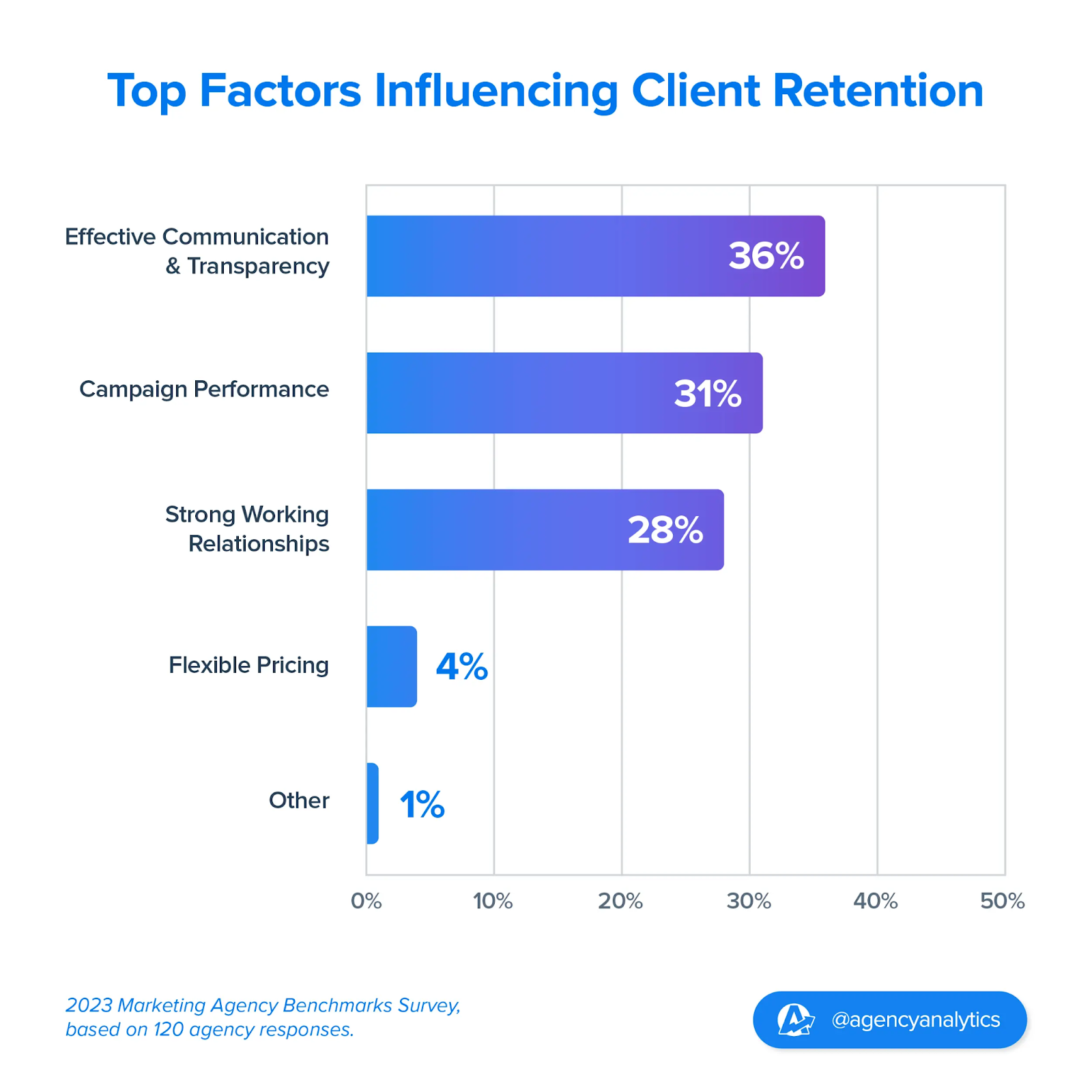
Image Source: AgencyAnalytics
When that clarity is missing, trust erodes quietly. Clients stop asking strategic questions and start questioning value. Reporting turns into a routine obligation instead of a tool for alignment and decision-making.
This is the point where many agencies assume the solution is better dashboards or redesigned reports. In reality, the issue runs deeper. This is exactly where white label SEO changes the equation. Not by polishing reports, but by strengthening the execution that feeds them.
How White Label SEO Simplifies Reporting at the Source?
1. Centralized SEO Execution Creates Cleaner Reporting Inputs
White label SEO partners operate on clearly documented SOPs and repeatable workflows. Instead of reinventing the process for every account, each campaign follows a proven strategic framework. Technical audits, on-page optimization, content planning, and link acquisition are executed in a deliberate, structured sequence.
This level of consistency has a direct impact on reporting quality. When execution follows the same framework across accounts, the data produced becomes easier to interpret. Performance trends are clearer. Anomalies stand out for the right reasons. Reporting shifts away from guesswork and toward pattern recognition.
Instead of asking whether a ranking change is a problem or an outlier, agencies can quickly connect performance movement to specific actions. When workflows are standardized, results become comparable across clients and time periods. That comparability is what turns raw data into meaningful insight.
A 2023 SEMrush study found that agencies using standardized SEO workflows reduced reporting errors by nearly 30% compared to those relying on ad hoc processes. Once execution is consistent, accuracy naturally follows.
2. Accuracy Improves Because Specialists Control the Process
White label SEO services focus exclusively on SEO. Their work is not divided between multiple services or competing priorities. This specialization allows them to control every step of the process, from implementation to validation.
These teams typically handle:
- Technical SEO audits and implementation
- On-page optimization aligned with search intent
- Link acquisition based on authority and relevance metrics
- Content performance analysis tied directly to rankings and organic traffic
Because fewer teams touch the work, there are fewer handoffs and fewer opportunities for miscommunication. The data used in reports comes directly from the actions performed, not from secondhand interpretations. Account managers are no longer piecing together updates from multiple sources or trying to reconcile conflicting metrics.
Instead, they can explain performance with confidence. The execution team has already verified the work, validated the data, and aligned it with the broader strategy. This confidence is what makes transparent reporting possible.
3. White Label SEO Enables Transparent, Defensible Client Conversations
When SEO execution is handled by specialists, agencies gain clarity in their client conversations. They can explain:
- What work was completed during the reporting period?
- Why were those actions prioritized over others?
- What impact is expected and over what timeframe?
There is no need to hide behind vague explanations or generic statements. Delays, plateaus, and fluctuations can be addressed directly, with context and supporting data. Transparency becomes a strength rather than a risk.
For example, instead of saying “rankings fluctuate,” agencies can explain the role of algorithm updates, competitive activity, or technical constraints, along with the corrective actions being taken. Clients may not love every answer, but they respect clarity.
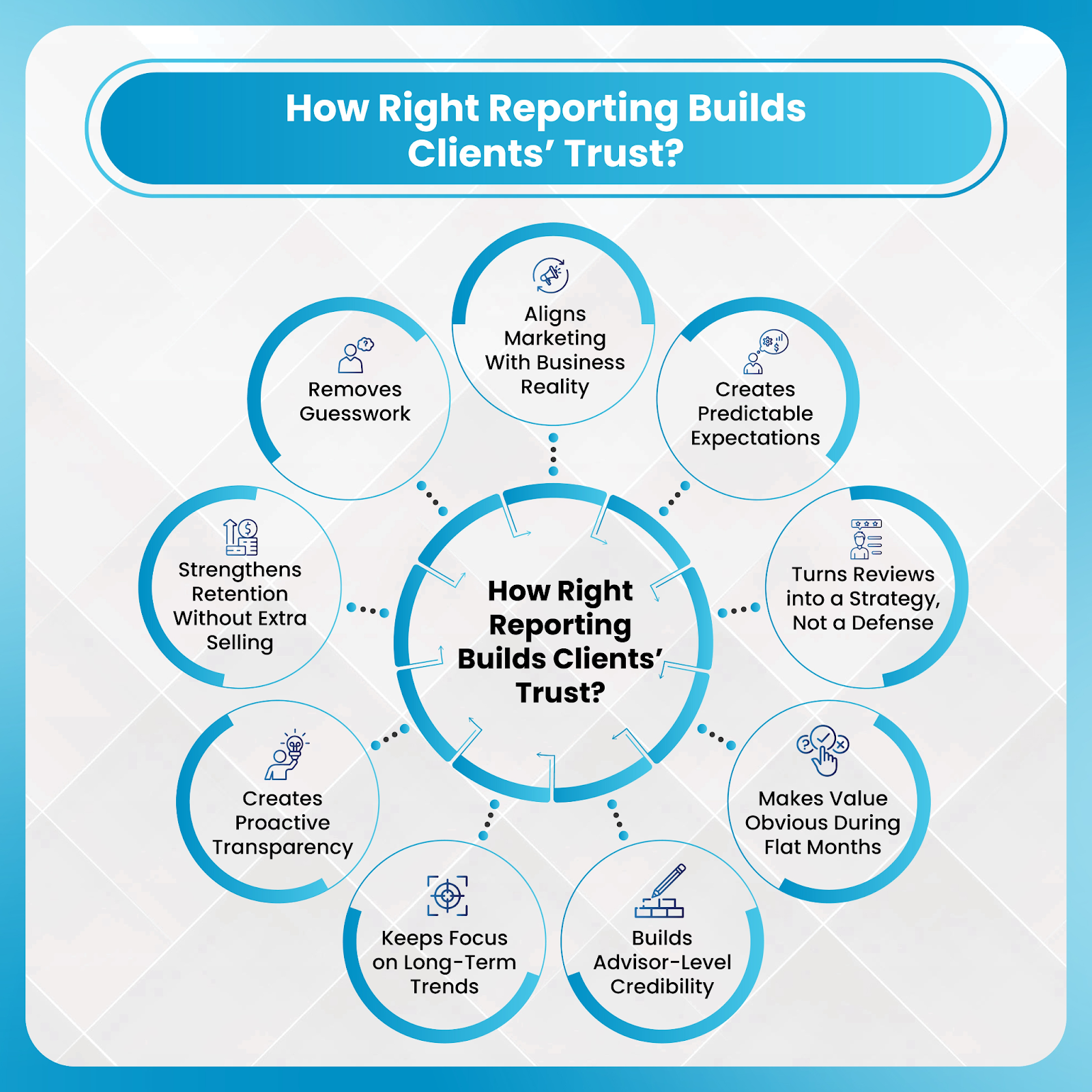
BrightLocal research supports this approach. Seventy-four percent of clients are more likely to remain with an agency that explains performance changes openly, even during downturns. White label SEO gives agencies the foundation they need to have those conversations with confidence.
Still, transparency alone does not solve the full challenge. Reporting also needs to scale as agencies grow.
4. White Label SEO Makes Reporting Scalable for Growing Agencies
As agencies add more clients, reporting complexity often increases faster than revenue. Each new account introduces more data, more deadlines, and more opportunities for inconsistency. Building in-house SEO teams to keep pace can be expensive and slow, especially when demand fluctuates.
White label SEO absorbs execution complexity without adding internal headcount. Because delivery follows a consistent model, reporting inputs remain stable even as client volume grows. Agencies do not need to reinvent reporting processes for each new account. The underlying execution stays the same.
Scalability is not just about automation. It is about removing operational friction upstream. When SEO delivery scales smoothly, reporting does not become a bottleneck. It remains predictable, efficient, and manageable.
This operational clarity also changes how agencies communicate their value to clients.
5. Better Execution Leads to More Strategic Reporting
When execution is reliable, reporting evolves naturally. The focus shifts from reactive explanations to forward-looking guidance. Reports move from: “Here’s what happened” to “Here’s what we’re doing next.”
Agencies spend less time defending performance and more time aligning strategy with client goals. Reporting meetings become planning sessions rather than performance reviews. Clients feel guided instead of updated.
Salesforce data shows that agencies positioning reports as strategic roadmaps see retention rates improve by up to 20%. The reason is simple. Clients stay when they understand the plan and trust the process.
Better execution produces cleaner data. Cleaner data creates clearer narratives. Clear narratives build long-term trust, which is ultimately what keeps client relationships strong.
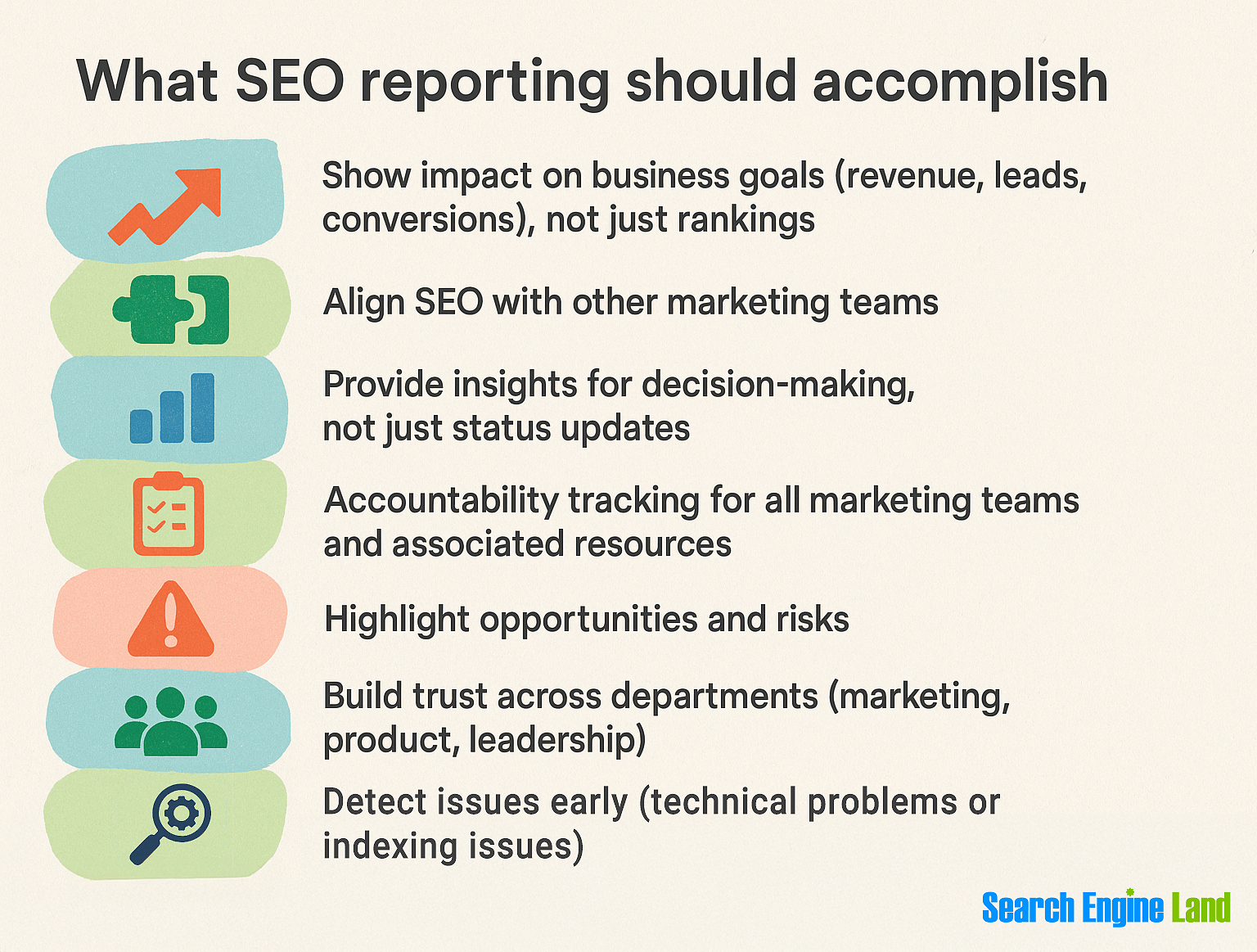
Image Source: Search Engine Land
How DashClicks White Label SEO Services Support Streamlined Client Reporting?
DashClicks approaches white label SEO as an operational foundation, not just a fulfillment layer. Its services are designed to support agencies that want consistent execution and reporting clarity. SEO delivery is standardized across technical SEO, on-page optimization, content, and link building. This ensures that every report is backed by structured work, not assumptions.
Because DashClicks relies on specialist-led delivery, data accuracy improves. Agencies receive clear insights tied directly to completed tasks and timelines. This makes it easier to explain performance without overcomplicating reports. Clear deliverables help agencies stay transparent and align reporting with real progress.
The scalable execution model also means agencies can grow without increasing reporting complexity. Whether managing a few clients or hundreds, the reporting narrative stays consistent. By fixing execution challenges at the source, DashClicks helps agencies simplify client reporting naturally and confidently.
Conclusion: White Label SEO Fixes Reporting by Fixing Execution
Many agencies assume reporting issues can be solved with new dashboards, more charts, or deeper data pulls. In practice, reporting problems are rarely about presentation. They are usually execution problems showing up downstream. When SEO delivery lacks consistency, reporting naturally becomes reactive, defensive, and harder to explain.
White label SEO does not replace reporting or mask performance. It simplifies reporting by strengthening what feeds it. Consistent workflows create cleaner inputs. Specialist-led execution produces more accurate data. Standardized processes make results easier to track, explain, and defend. The outcome is not just better-looking reports, but clearer stories that clients can actually understand.
With the right execution partner, agencies gain transparency instead of tension. Reporting shifts from damage control to strategic guidance. Conversations become more confident, expectations become clearer, and trust becomes easier to maintain.
For agencies that want better reports, the answer is not more metrics or more complexity. It is better executed. When delivery is solid, reporting takes care of itself.
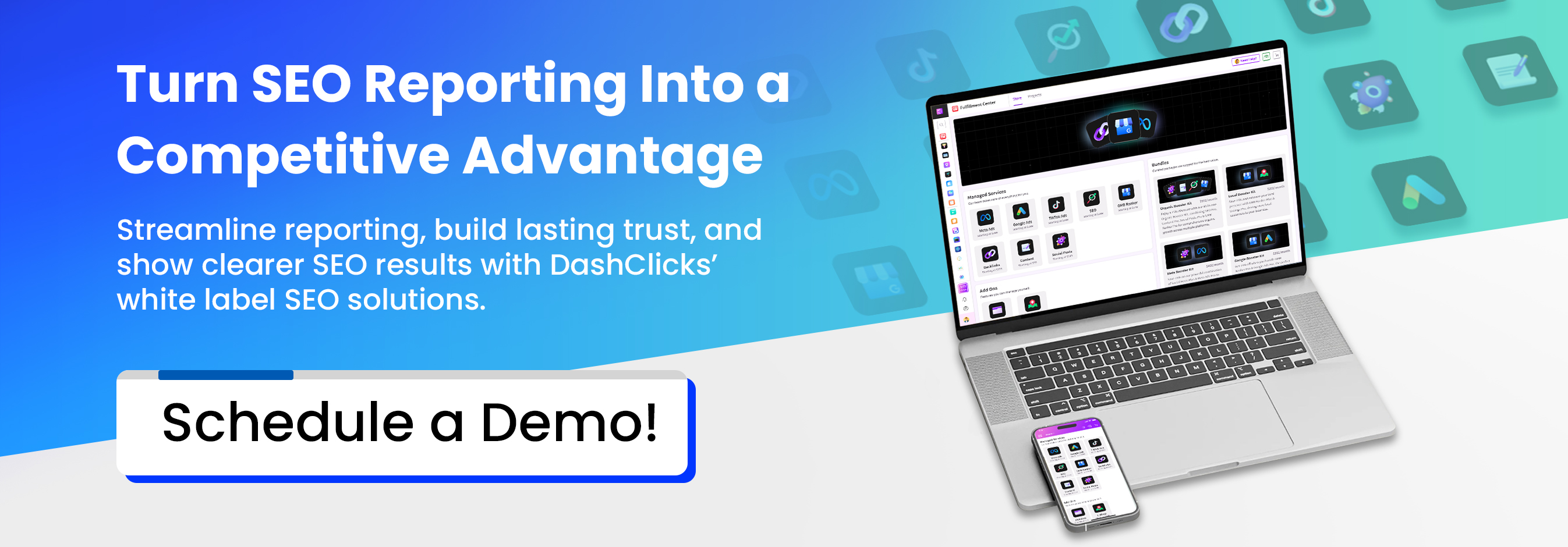

How White Label PPC Improves Client Confidence in Paid Media Performance
White label PPC has become a core growth lever for modern digital agencies. At its simplest, white label PPC means outsourcing paid media execution to a specialized provider while presenting the service under your own agency brand. Your clients see your logo, your reports, and your strategy, while experienced PPC professionals handle the day-to-day campaign work behind the scenes.
This model has gained momentum as agencies expand beyond SEO, web design, and social media into performance-driven advertising. Paid media now plays a central role in how clients judge marketing success. Industry research consistently shows that agencies offering PPC services generate higher revenue per client, with some reports indicating gains of around 30% to 35% compared to agencies without paid media capabilities.
Client confidence sits at the center of this shift. Paid media performance is tied directly to budget decisions, ROI expectations, and retention. When campaigns perform well and results are clearly explained, trust grows. When performance fluctuates or reporting feels vague, confidence drops fast.
White label PPC helps agencies solve this problem by strengthening three critical pillars of trust:
- Consistent campaign performance
- Transparent, easy-to-understand reporting
- Expert optimization that adapts to platform changes
Before exploring how white label PPC delivers on these pillars, it helps to understand why paid media often becomes a confidence risk for agencies and their clients.
Paid Media Challenges That Undermine Client Confidence
1. Inconsistent Performance From In-House or Under-Resourced PPC Teams
Many agencies handle PPC with small teams or generalists who manage multiple marketing channels at once. This setup can work in the early stages, especially with a limited number of accounts. However, as campaigns grow in size and complexity, performance often becomes inconsistent.
Common challenges include:
- Rising cost per click with no clear explanation for clients
- Conversion rates that fluctuate from month to month
- Campaigns running for long periods without structured testing or an updated strategy
Paid media platforms have grown more competitive every year. Average CPCs across Google Ads and Meta continue to rise due to increased advertiser demand and automation-driven bidding systems. Without deep platform expertise and regular optimization, it becomes harder to control costs and maintain steady results.
While clients may not understand the technical reasons behind these changes, they clearly feel the impact on performance. When results become unpredictable, confidence in the agency naturally starts to decline.
2. Lack of Transparent Reporting and Accountability
Reporting is one of the biggest confidence gaps in paid media management. Clients want clarity around how their budget is being spent and what outcomes it is producing.
A widely referenced 2023 industry survey found that over 60% of clients consider transparent reporting the most important factor in deciding whether to continue working with an agency. When reporting lacks clarity, trust weakens quickly.
Typical reporting issues include:
- Generic monthly reports that offer little insight
- Metrics presented without a clear business context
- Limited visibility into budget allocation or optimization decisions
When clients cannot clearly connect ad spend to meaningful outcomes, even campaigns with acceptable performance can feel uncertain. Transparency is not just about sharing numbers. It is about explaining what those numbers mean and how they support business goals.
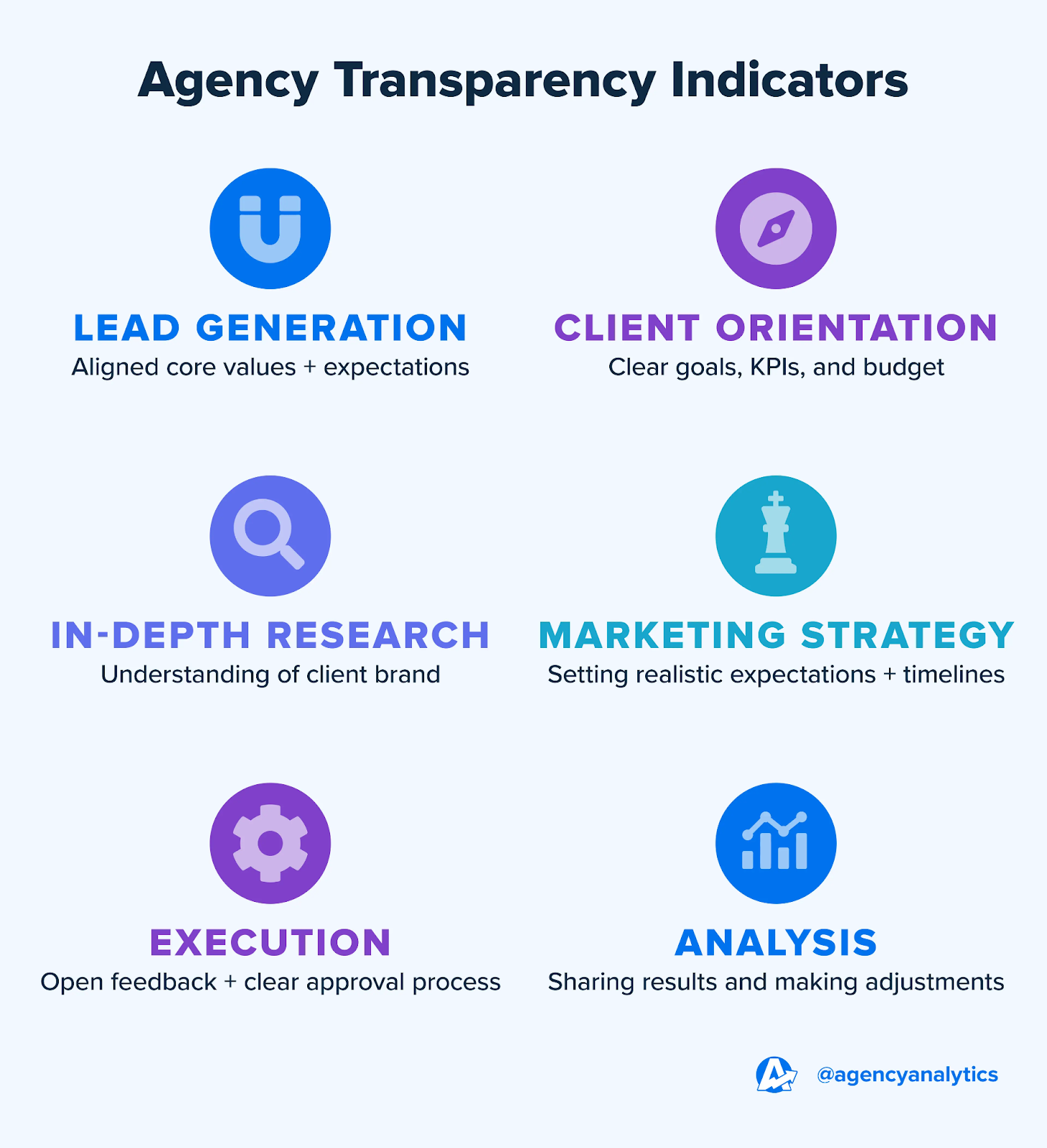
Image Source: AgencyAnalytics
3. Difficulty Scaling Expertise and Meeting Expectations
Paid media requires constant attention and specialized knowledge. Platform updates, bidding model changes, and new ad formats demand ongoing learning and fast adaptation. Agencies without dedicated PPC specialists often struggle to keep pace.
As client portfolios expand, common problems emerge:
- Optimization becomes reactive instead of planned and proactive
- Strategic opportunities are delayed or overlooked
- Performance quality varies from one account to another
Clients notice when execution feels uneven. Over time, this inconsistency erodes confidence in the agency’s ability to manage paid media at scale.
These challenges point to a clear reality. Client trust in paid media depends on consistent performance, clear communication, and expert execution. White label PPC addresses these gaps directly, making it a powerful solution for agencies looking to build and maintain client confidence.
How White Label PPC Builds Client Confidence?
A. Consistent Performance Through Expert Optimization
1. Dedicated PPC Expertise Drives Better Results
White label PPC providers focus exclusively on paid advertising. Their teams live inside platforms like Google Ads and Meta Ads every day. This depth of experience leads to more disciplined campaign management.
Agencies that rely on white label PPC often report:
- Higher conversion rates compared to generalist setups
- Improved ROI through refined targeting and bidding
- Faster response to performance changes
Several industry benchmarks suggest that accounts managed by specialized PPC teams can achieve 25 to 35 percent stronger conversion efficiency than campaigns run without dedicated expertise.
This consistency reassures clients. Predictable performance builds trust far more effectively than occasional spikes followed by drops.
2. Continuous Testing and Iterative Improvements
White label PPC is built on structured optimization. Instead of setting campaigns and letting them run, experienced teams follow regular testing cycles.
These often include:
- Ongoing A/B testing of ad copy and creatives
- Audience refinement based on performance data
- Bid and budget adjustments aligned with KPIs
Weekly monitoring and documented changes show clients that campaigns are actively managed. This steady rhythm of improvement reinforces confidence in paid media performance.
Examples of Performance Discipline
Consider an agency managing PPC in-house with limited resources. Campaigns run for months with minimal changes, leading to flat results. After switching to white label PPC, the same accounts follow structured testing schedules, clearer bidding strategies, and consistent reporting.
Within a few months, performance stabilizes. Conversion costs become more predictable. Clients notice the difference, not just in results, but in how confidently the agency explains them.
Strong performance lays the foundation, but confidence also depends on transparency. Clients need to understand what is happening, not just see numbers on a page.
B. Transparent Reporting That Reinforces Trust
1. Branded Reporting and Clear Metrics Communication
White label PPC enables agencies to deliver professional reports under their own brand, creating a seamless experience for clients. Familiar visuals, consistent language, and clear structure make it easier for clients to understand performance without feeling disconnected from the process. At the same time, the depth of insight goes beyond surface-level numbers.
Modern white label reporting typically includes:
- White labeled dashboards with real-time performance data
- Clear explanations of trends, shifts, and optimization decisions
- Direct alignment between campaign metrics and business goals
This level of clarity removes doubt. When clients can see exactly how campaigns are performing and why changes are being made, trust grows naturally.
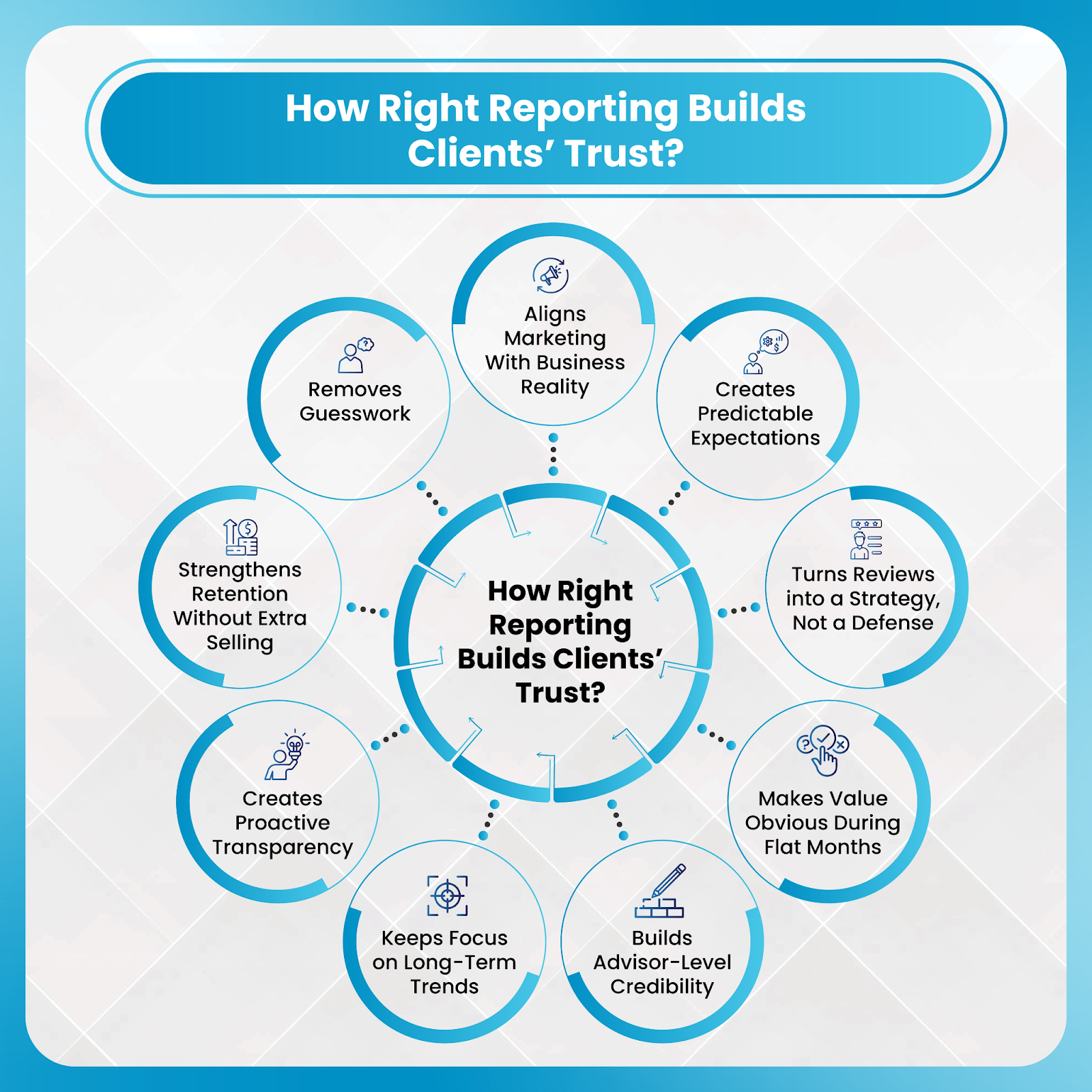
2. Key Metrics Clients Care About
Not every metric builds confidence. Effective white label PPC reporting focuses on data points that directly reflect business outcomes, not just platform activity.
Common metrics clients value include:
- Cost per click to evaluate efficiency
- Cost per acquisition to understand the lead or sale value
- Conversion rate to assess campaign quality
- ROAS or revenue impact for e-commerce-focused accounts
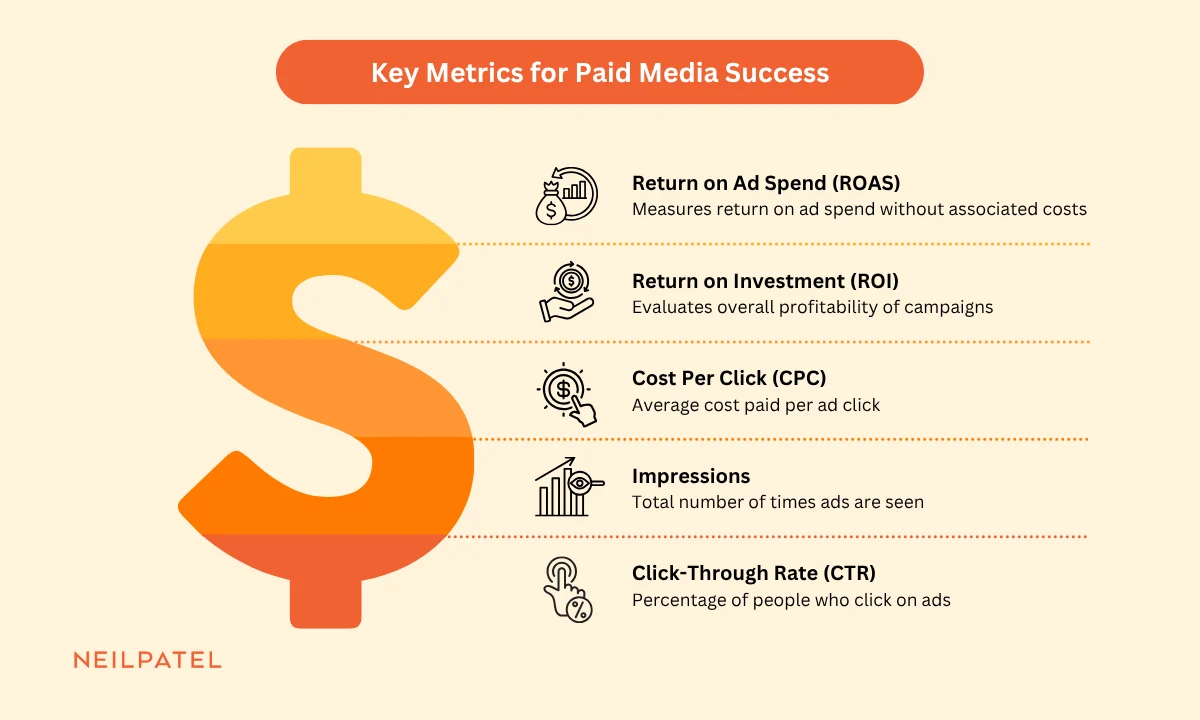
Image Source: NeilPatel
When agencies explain what these metrics mean and how they connect to results, clients feel informed rather than overwhelmed. This understanding strengthens confidence in both the strategy and the execution.
3. Structured Reporting Cadence and Client Alignment
Consistency in communication is just as important as consistency in results. Agencies using white label PPC services often rely on a structured reporting cadence that keeps clients engaged and aligned throughout the campaign lifecycle.
This approach may include:
- Weekly performance snapshots to highlight short-term trends
- Monthly summaries with insights, wins, and recommended actions
- Quarterly reviews focused on long-term strategy and growth
Research on agency retention consistently shows that clients who receive regular, proactive updates are far more likely to stay long term. Transparency builds confidence by keeping clients involved in the process, rather than guessing about performance.
When strong results are paired with clear, consistent reporting, clients gain confidence that their campaigns are being actively managed and continuously improved behind the scenes.
C. Expert Optimization as a Strategic Confidence Builder
1. Access to Specialized PPC Knowledge Without Hiring Headcount
Hiring and retaining skilled PPC specialists is costly and time-consuming. Competitive salaries, ongoing training, and platform certifications can quickly stretch an agency’s budget. A white label PPC agency removes this barrier by giving agencies immediate access to experienced paid media professionals without adding internal overhead or long-term hiring commitments.
This approach allows agencies to scale confidently while maintaining quality across all accounts. Key advantages include:
- Faster onboarding of new clients without capacity concerns
- Access to advanced tools, automation, and platform-level insights
- Consistent best practices applied across campaigns and industries
From a client perspective, this setup builds reassurance. Campaigns are handled by specialists who focus solely on paid media, even though the service is delivered under the agency’s brand. That expertise shows up in performance stability, clearer strategies, and fewer costly mistakes.
2. Proactive Strategy Adjustments and Bid Management
Paid media platforms evolve constantly. Algorithm updates, new ad formats, and policy changes can shift performance with little notice. Agencies that react late often see rising costs or declining results before action is taken.
White label PPC teams stay close to these changes. They monitor performance signals daily and adjust bids, targeting, creatives, and budgets before small issues turn into bigger problems. This proactive management approach signals to clients that their ad spend is being actively protected and optimized, not passively monitored.
When clients see quick, informed responses to market or platform changes, confidence in the agency’s paid media capabilities increases significantly.
3. Client Confidence in Continuous Improvement
Confidence is reinforced when progress is visible and ongoing. White label PPC supports this by providing regular optimization insights and clear recommendations tied to campaign goals.
Examples of continuous improvement include:
- Refining KPIs as campaigns move from testing to scaling phases
- Expanding into new audiences once core performance is stable
- Increasing budgets strategically based on proven results rather than guesswork
This steady evolution shows clients that their campaigns are moving forward with purpose. They feel supported, informed, and confident that their paid media performance is improving over time.
Taken together, expert execution, proactive optimization, and consistent communication transform white label PPC into a confidence engine for agencies and the clients they serve.
How DashClicks’ White Label PPC Services Build Client Confidence?
A practical example of these principles in action can be seen in the white label PPC services offered by DashClicks. The platform supports agencies by providing a structured, scalable approach to paid media management. Their model is designed to strengthen client confidence at every stage of the campaign lifecycle.
DashClicks delivers consistent performance through dedicated PPC specialists who follow standardized optimization processes. Campaigns are actively monitored, tested, and refined, helping agencies maintain stable results across industries and account sizes without internal strain.
Transparent, white labeled reporting is another key strength. Agencies receive branded dashboards and reports that clearly communicate performance metrics such as CPC, CPA, and conversion trends. This clarity allows agencies to confidently explain results and ad spend decisions to their clients.
The platform also removes the hiring risk that often holds agencies back. By giving access to experienced PPC professionals, agencies can scale paid media services quickly and responsibly. Campaigns benefit from expert optimization without the delays and costs associated with building in-house teams.
The outcome for agencies is clear. By partnering with DashClicks, agencies enhance client confidence through reliable performance, clear reporting, and expert-led optimization. This positions them as trusted paid media partners rather than vendors reacting to issues.
Conclusion
Client confidence in paid media performance is built on three pillars: consistent results, transparent reporting, and expert optimization. White label PPC strengthens all three.
By leveraging specialized teams, agencies can deliver steadier performance even as competition and costs rise. Clear, branded reporting helps clients understand exactly how their budgets are used and what outcomes they generate. Expert optimization ensures campaigns evolve with platforms and market conditions.
For agencies, white label PPC is more than outsourcing. It is a strategic way to expand services, improve retention, and scale without sacrificing quality. Clients judge agencies by results they can see, understand, and trust. White label PPC helps agencies meet that standard consistently.
If your agency is evaluating gaps in PPC delivery or looking to strengthen client confidence in paid media performance, exploring a white label partnership is a smart next step. DashClicks provides the expertise, transparency, and structure agencies need to grow paid media services with confidence.
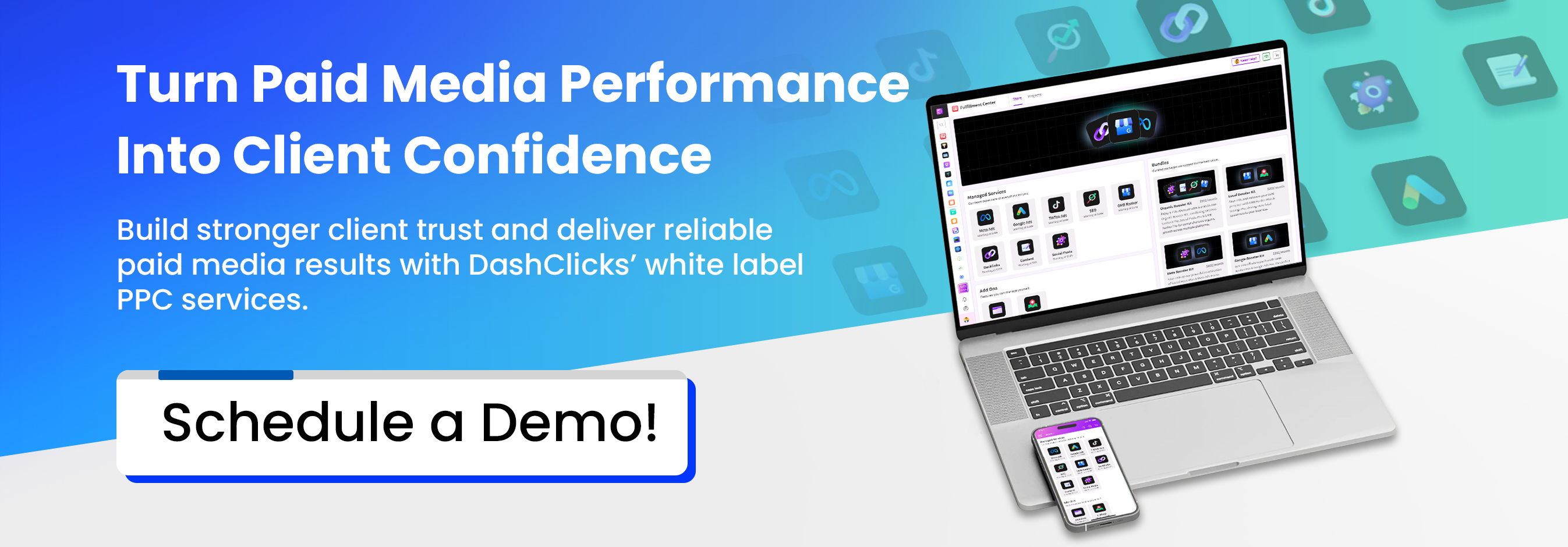

Is Your White Label SEO Partner Holding You Back? When to Make the Switch
For many digital agencies, white label SEO is the engine behind steady recurring revenue. It allows teams to offer search services without hiring, training, and managing an in-house SEO department. On paper, it is efficient and scalable. In practice, it can quietly become a growth blocker.
Agencies often sense something is off long before they can clearly define it. Client results feel flat. Communication takes longer. Reports look busy, but do not explain real progress. Retainers stay the same while costs and effort creep up. Over time, these issues affect more than SEO performance. They impact client trust, retention, and your agency’s reputation.
External execution plays a direct role in how your agency grows. When your white label SEO partner performs well, your brand looks strong. When they struggle, your agency absorbs the blame. The goal of this blog is to help you recognize when your current partner may be holding you back and how to identify a partner that supports long-term, sustainable growth.
When Your White Label SEO Partner Limits Agency Growth
Before jumping into solutions or switching providers, agencies need to clearly recognize the warning signs of an underperforming SEO fulfillment partner. These problems rarely appear overnight. More often, they develop gradually and seem manageable in the early stages.
Because the impact is slow, many agencies adapt around the issues instead of addressing the root cause. Over time, what felt like minor friction turns into a serious obstacle to growth, client retention, and profitability.
1. Growing Demand Meets Limited Delivery
SEO continues to be one of the most in-demand digital services across industries. Research consistently shows that nearly 70% of agencies consider SEO a core offering, and a large share of them rely on outsourced fulfillment due to rising labor costs and a shortage of experienced talent. At the same time, organic search remains a dominant traffic source, accounting for more than half of all website visits on average.
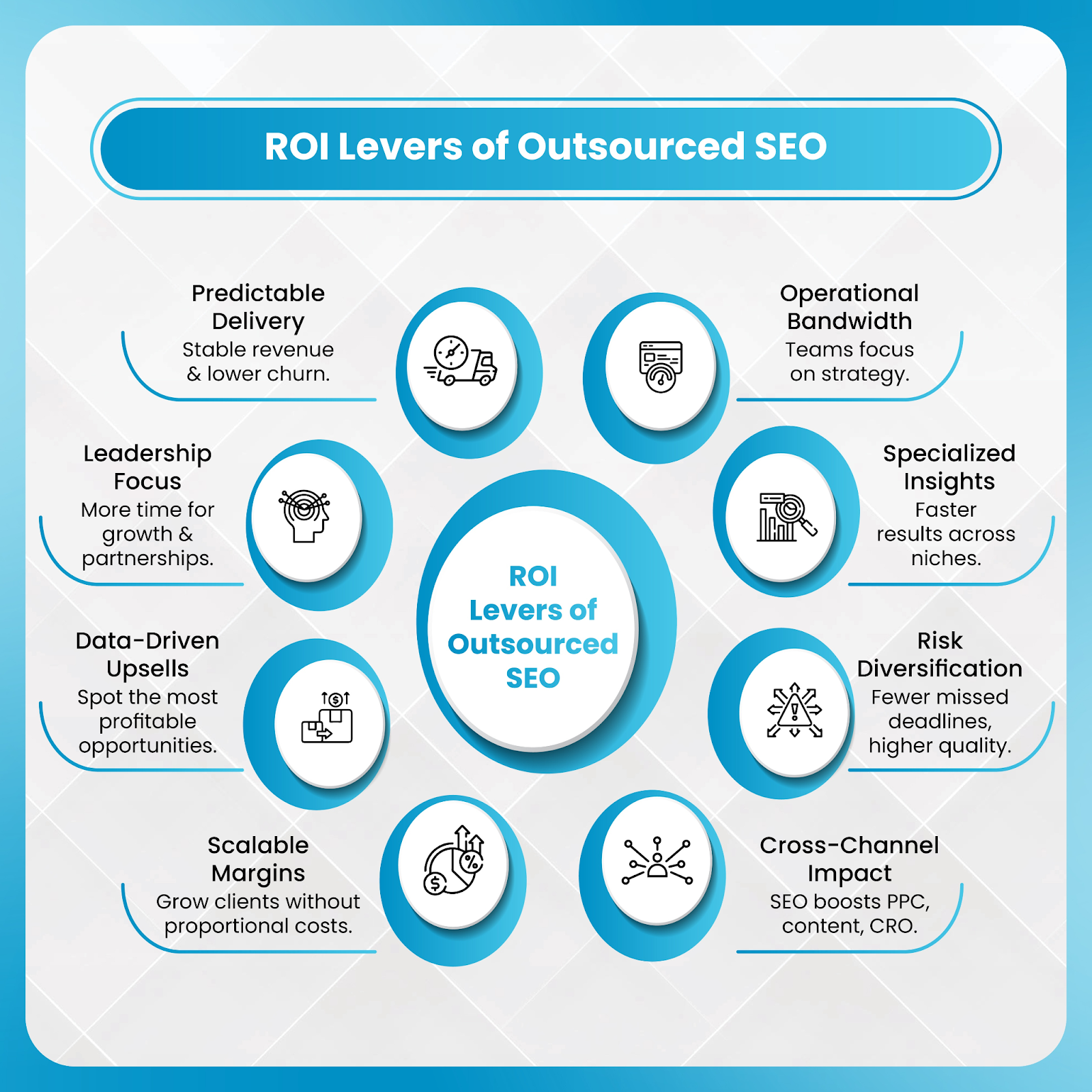
The challenge begins when your white label SEO services provider cannot scale at the same pace as your agency. As new clients come on board, delivery timelines stretch longer than expected. Reports arrive late. Tasks that once felt thorough start to feel rushed. Strategies become repetitive, with the same approach applied across very different industries and goals.
Instead of supporting growth, the outsourcing model quietly creates a ceiling. Sales slow because operations cannot keep up. Account managers spend more time managing delays than building client relationships. A scalable white label SEO partner should be able to absorb increased demand smoothly, not become a bottleneck when your agency gains momentum.
2. Quality and Results Tell the True Story
One of the clearest indicators of an underperforming partner is a focus on volume rather than impact. Publishing blog posts, building links, or completing audits may look productive on paper, but none of it matters if rankings and traffic remain flat.
Organic performance plays a direct role in client satisfaction and retention. Studies show that 75% of users never scroll past the first page of search results. If your clients are not steadily moving closer to those top positions, the perceived value of SEO quickly fades. Clients may not understand every technical detail, but they do understand when results stall.
Common warning signs include:
- Little or no improvement in keyword rankings over several months
- Technical SEO issues identified but left unresolved
- Traffic increases that fail to generate leads, calls, or sales
- Reliance on outdated or risky tactics such as low-quality link building
Low-quality SEO does more than slow progress. In some cases, it can actively harm a website’s visibility, triggering ranking drops or manual penalties. Recovering from this damage often takes months of corrective work, putting client relationships and your agency’s reputation at risk.
When results consistently fall short, it is a clear signal that fulfillment quality needs closer scrutiny.
3. Communication Breakdowns and Visibility Gaps
Even when SEO execution is technically sound, poor communication can make results feel underwhelming. Agencies rely on their white label SEO partner to clearly explain what is happening behind the scenes, why certain actions are taken, and what outcomes to expect next. Without that clarity, even good work loses its impact.
When updates arrive late or lack detail, agency teams are left scrambling during client calls. Account managers spend time interpreting vague reports, chasing answers, or trying to justify performance without enough context. This adds internal pressure and increases the risk of miscommunication with clients. Over time, confidence starts to slip, both within your team and in the eyes of your clients.
A lack of transparency around tactics, timelines, and priorities also makes it harder to explain ROI. Clients want to understand how their investment connects to results. If your partner cannot clearly outline progress and next steps, setting realistic expectations becomes difficult. Clear, proactive communication is not a nice-to-have. It is a foundation for smooth operations and long-term client trust.
4. Over-Dependence Without Strategic Input
Many white label SEO providers operate as task-based vendors. They follow a standard checklist, deliver monthly outputs, and move on to the next account. While this approach may be sufficient for very small or short-term projects, it limits growth at scale.
SEO is not static. Search algorithms change, competitors adjust strategies, and client goals evolve. A partner that only executes tasks without contributing strategic insight places the burden of planning entirely on your agency. Your team ends up doing the thinking while the provider does the minimum required work.
Over time, this dynamic turns SEO into a commoditized service with thin margins. There is little room for innovation, customization, or premium positioning. Strategic input is what elevates SEO from a line item to a value-driven service. It is also what separates a simple vendor from a true growth partner.
5. Profit and Operational Strain
At first glance, low-cost providers may seem attractive. In reality, they often come with hidden expenses. Revisions, quality issues, missed deadlines, and client dissatisfaction all add to operational overhead. Each round of rework pulls time away from sales, strategy, and relationship building.
Mid-tier providers may deliver acceptable results but still create limitations. When execution is just good enough, it becomes difficult to differentiate your agency or justify higher retainers. Profit margins tighten, and growth slows.
Agencies must balance service quality with profitability. If your white label SEO partner makes it harder to raise prices, retain clients, or stand out in a crowded market, they are restricting your business potential. These challenges go beyond short-term inconvenience. They affect retention, scalability, and the long-term value of your agency.
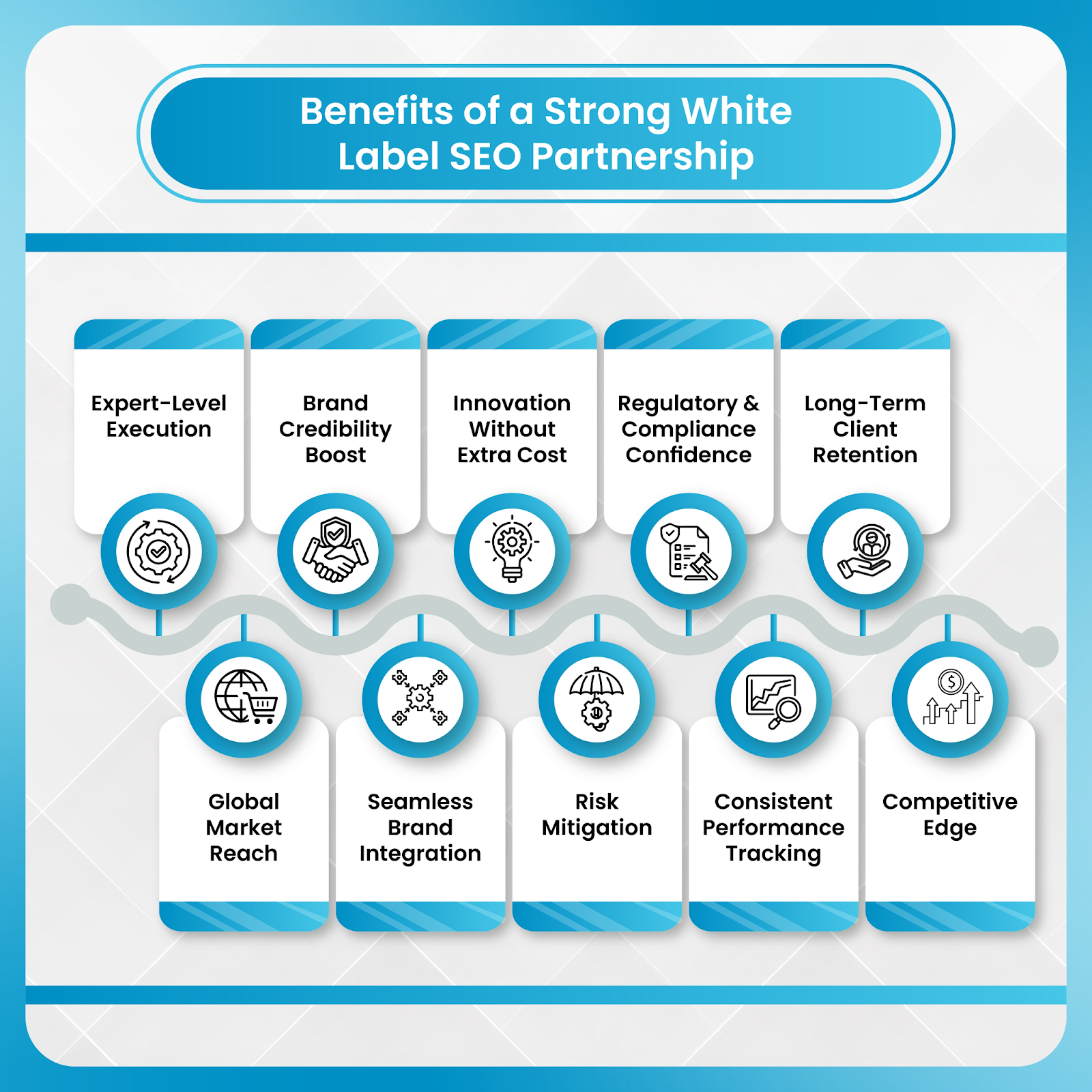
This naturally leads to a critical question: when does sticking with the same partner cost more than making the switch?
When to Actually Make the Switch: Critical Signs It’s Time
Not every challenge means you should immediately change partners. SEO takes time, and some fluctuations are normal. However, certain patterns indicate deeper issues that require action.
1. SEO Performance Has Plateaued or Declined
If rankings, organic traffic, or conversions have stalled for multiple quarters, it is time to look closely at execution. A capable white label SEO partner should adapt strategies based on data and algorithm changes.
Consistent stagnation often means strategies are outdated or not customized to the client’s market. Reports should show movement, learning, and adjustment, not the same numbers month after month.
2. Reporting Is Vague or Not Actionable
Modern clients expect clarity. Reports focused only on impressions or generic metrics no longer cut it. According to industry surveys, over 60% of agencies say clients now expect SEO reporting tied directly to traffic quality and business outcomes.
If reports lack context or clear next steps, your agency is left translating data into value. Strong reporting should highlight:
- Keyword movement that matters to the business
- Organic traffic trends and engagement
- Actions taken and why they matter
When reporting feels padded or unclear, value becomes questionable.
3. Communication or Responsiveness Is Slow
Delayed replies and missed updates disrupt internal workflows. Agencies rely on timely communication to plan campaigns, prepare reports, and respond to client questions.
Slow responsiveness can make your agency appear disorganized, even if the issue sits with your partner. Over time, this affects credibility and trust.
4. No Scalability or Adaptability
As your client base grows, needs change. You may add e-commerce brands, local businesses, or larger multi-location clients. A rigid white label SEO provider that cannot adjust strategies or scale resources becomes a liability.
A simple test is to ask whether your partner could support double or triple your current SEO volume without sacrificing quality. If the answer is unclear, growth will be difficult.
5. You’re Losing Clients or Seeing Retention Drops
Client retention is one of the strongest indicators of service health. Studies show it costs five times more to acquire a new client than to retain an existing one.
If clients leave due to poor SEO performance or unclear value, your partner plays a direct role. When churn connects back to SEO results, switching becomes a strategic necessity rather than an option.
These signs often appear gradually. When several show up together, it is a clear signal that change is needed.
What to Look for in a Strategic White Label SEO Partner?
Replacing a provider carries risk. Choosing the right one transforms SEO from a burden into a competitive advantage.
1. Transparent and Data-Driven Reporting
Look for partners that focus on outcomes, not just tasks. Reporting should clearly connect effort to performance.
White-labeled dashboards that agencies can share directly with clients save time and reinforce professionalism.
2. Proven, Ethical SEO Methodologies
Search engines evolve constantly. Your partner should demonstrate expertise in:
- Technical SEO and site health
- On-page optimization
- Content strategy aligned with search intent
- Ethical link acquisition
Avoid providers that promise guaranteed rankings. These claims often rely on risky tactics that can backfire.
3. Scalable Delivery and Specialist Expertise
High-quality SEO requires specialists, not generalists doing everything. Strong partners have teams focused on technical SEO, content, and link building.
Scalability means being able to absorb growth without delays or drops in quality.
4. Strategic Collaboration and Thought Partnership
The best white label SEO services provider acts as an extension of your agency. They share insights, help plan campaigns, and adapt strategies based on client goals.
This level of collaboration reduces internal workload and improves outcomes.
5. Communication, Responsiveness, and Accountability
Clear communication saves time and prevents misunderstandings. Partners should provide regular updates, quick responses, and proactive problem-solving.
Accountability builds trust and smooths client interactions.
6. Focus on Client Retention and ROI
SEO success should support long-term relationships. Partners that understand retention metrics and ROI help agencies build stable, predictable revenue.

Making the Transition: Best Practices for Switching Providers
Switching providers does not have to be disruptive if handled carefully.
- Plan a Data-Driven Transition Timeline: Audit current keywords, traffic, and deliverables before ending an agreement. This creates a clear baseline for the new partner.
- Document Processes and Knowledge Transfer: Ensure access to accounts, content, and technical assets. Clear documentation prevents gaps and lost momentum.
- Maintain Communication With Clients: Position the change as a strategic upgrade. Transparency reassures clients and sets expectations.
- Run Side-By-Side Testing During Transition: When possible, test the new provider output alongside the old one. This builds confidence before a full transition.
How DashClicks’ White Label SEO Services Support Agency Growth?
Once agencies understand what to demand from a white label SEO partner, the next step is choosing a provider built for scale. DashClicks focuses on supporting agencies with a model designed around growth, transparency, and long-term results.
DashClicks offers white label SEO services created specifically for digital agencies. Instead of generic execution, their approach emphasizes structured strategy, ethical SEO practices, and consistent delivery across different industries and client sizes. Dedicated SEO specialists handle technical optimization, content planning, and ongoing improvements while agencies maintain full brand ownership.
One key advantage is transparency. The platform provides clear, white-labeled reporting that agencies can confidently share with clients. This helps explain progress, demonstrate value, and reduce time spent translating data into insights. Communication is structured to support agency workflows, making it easier to manage multiple accounts without internal strain.
Scalability is another core focus. As agencies grow from a handful of SEO clients to dozens or more, the platform supports expansion without forcing agencies to hire internally. This allows teams to focus on sales, strategy, and client relationships while maintaining consistent SEO quality.
By aligning execution with agency goals, DashClicks helps turn SEO outsourcing into a growth asset rather than an operational risk.
Conclusion
White label SEO can be one of the strongest drivers of agency growth when it is aligned with your goals. When misaligned, it quietly drains time, profit, and client trust.
Recognizing the signs of an underperforming partner allows you to act before damage compounds. Choosing a strategic, scalable partner improves retention, strengthens margins, and protects your reputation.
If you suspect your current white label SEO partner is holding you back, it may be time to reassess what you truly need from SEO outsourcing. A strong partner should help your agency move faster, deliver better results, and grow with confidence.
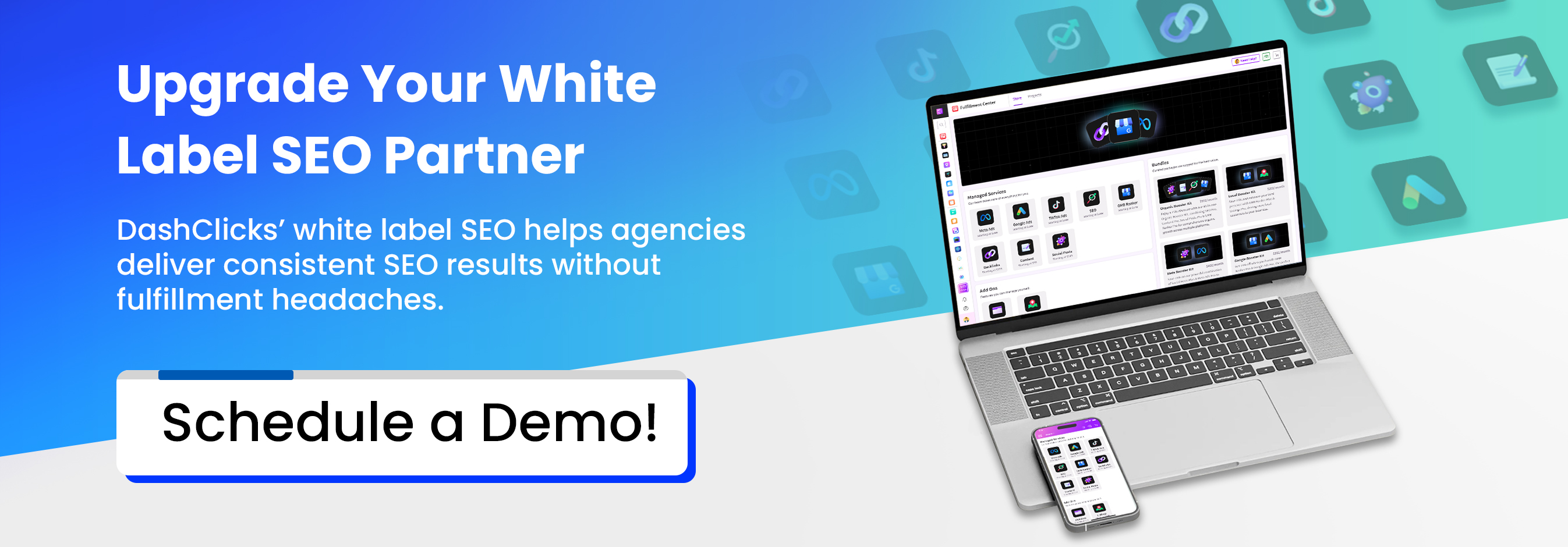
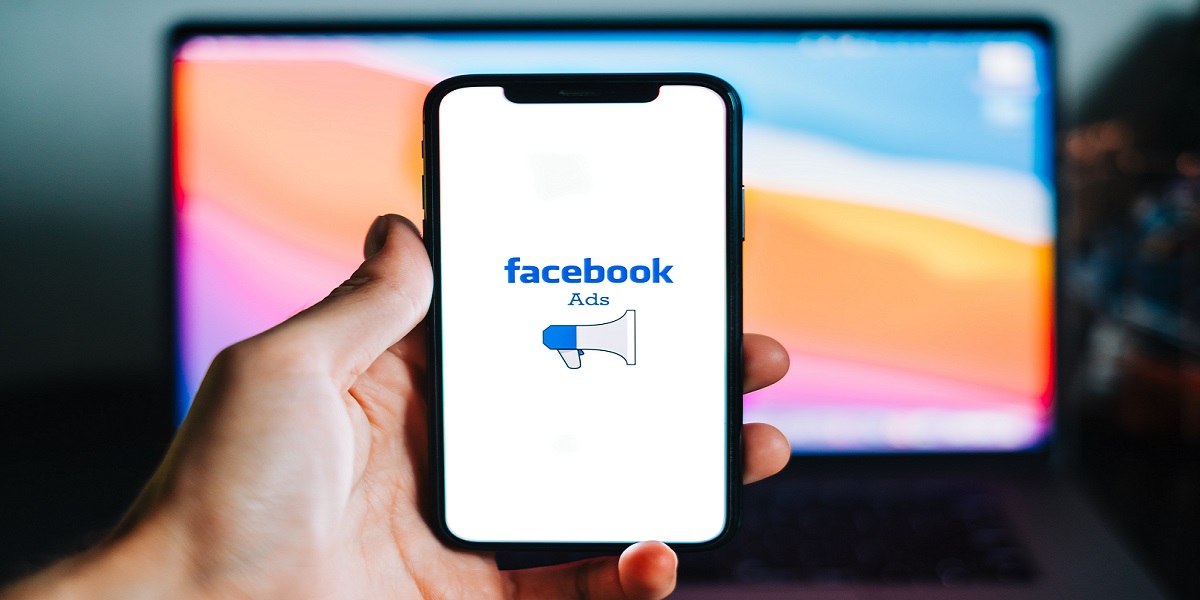
Managing Creative Fatigue at Scale: How Agencies Use White Label Facebook Ads
Facebook advertising, now part of the broader Meta ecosystem, continues to be one of the most effective paid channels for lead generation and eCommerce growth. Despite rising competition and evolving algorithms, businesses still rely heavily on Facebook and Instagram to reach highly targeted audiences at scale. According to Meta’s own disclosures and third-party benchmarks from Wordstream, average Facebook ad costs have increased steadily year over year, with CPMs rising by more than 10% in many industries. As costs rise, creative quality and relevance have become central to maintaining performance.
One of the biggest challenges agencies face today is creative fatigue. This happens when audiences are repeatedly exposed to the same ads, causing engagement to drop and performance to decline. Click-through rates fall, CPMs climb, and conversions slow down. Creative fatigue is not just a creative issue. It is a scaling problem that impacts operations, resources, and long-term results.
For agencies managing multiple clients, campaigns, and audience segments, the issue compounds quickly. What works for one audience may fatigue another within days. Refreshing ads manually across dozens or even hundreds of ad sets becomes unsustainable. Internal teams burn out, creative pipelines clog, and performance suffers.
As the industry moves toward 2026 and beyond, agencies are realizing that ad success depends on systems, not just talent. Many are adopting white label Facebook advertising models to manage creative fatigue more effectively. By combining data-driven insights, structured creative rotation, and dedicated production support, white label Facebook ads services help agencies maintain relevance without overwhelming internal teams.
This shift is not about outsourcing creativity. It is about building scalable processes that keep ads fresh, audiences engaged, and performance stable across accounts.
Why Creative Fatigue Is a Scaling Bottleneck?
What Creative Fatigue Is and Why It Matters?
Creative fatigue refers to the gradual decline in ad performance that occurs when audiences are exposed to the same creative assets too frequently. At first, an ad may perform well. It grabs attention, drives clicks, and converts. Over time, however, repeated exposure causes users to scroll past the message without engaging. Familiarity replaces curiosity, and performance begins to slide.
Facebook’s algorithm is built to reward relevance and engagement. When engagement drops, the system interprets this as reduced user interest. As a result, ads may be shown less often, delivered to less responsive segments, or served at a higher cost. This is why creative fatigue often leads directly to rising CPMs and weaker results, even when targeting and budgets remain unchanged.
Common signals of creative fatigue include:
- A consistent decline in click-through rate over time
- Rising CPM and cost per result despite stable targeting
- Lower quality, engagement, or conversion rankings
- Increasing frequency without a corresponding lift in conversions
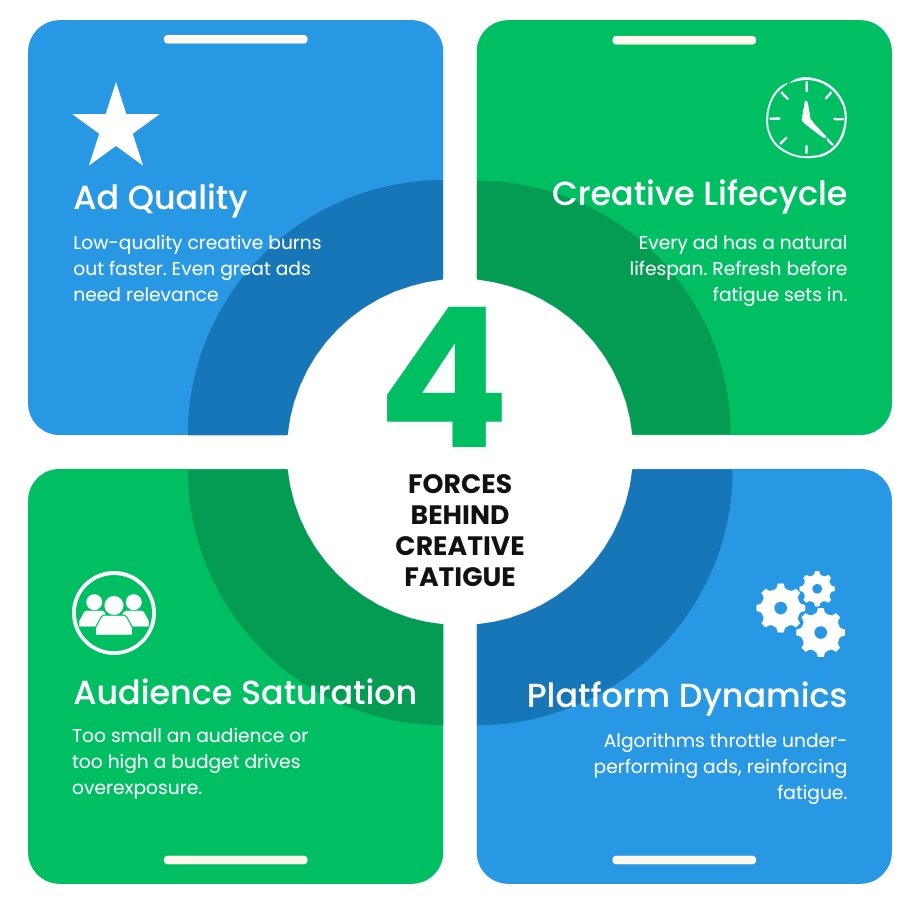
Image Source: Search Engine Land
Industry benchmarks highlight how quickly this issue can surface. Insights from Meta business reports and Socialbakers indicate that many Facebook ads experience noticeable performance decay within three to four weeks if creatives are not refreshed. In some cases, agencies report declines of 20 to 40% in CTR or conversion efficiency during that window.
At a small scale, creative fatigue is relatively easy to manage. A single campaign or a handful of ads can be refreshed manually. At agency scale, the impact is far more severe. Creative fatigue becomes an operational challenge that affects delivery costs, margins, and client confidence. When performance drops across multiple accounts at once, the pressure on teams increases quickly.
1. Audience Fragmentation Makes Fatigue Worse
Modern Facebook advertising no longer relies on broad targeting alone. Agencies now run highly layered strategies designed to reach users at different stages of awareness and intent. These strategies often include:
- Interest and behavior-based segments
- Custom audiences built from website visitors and email lists
- Multiple lookalike audiences with varying similarity levels
- Retargeting campaigns across different funnel stages
Each of these audience types responds differently to creative messaging. A high-energy video ad may perform well with cold audiences but fatigue quickly in retargeting campaigns. A testimonial might resonate with one demographic while failing to connect with another. Even small changes in audience makeup can alter how quickly a creative loses effectiveness.
As audience complexity increases, creative fatigue accelerates. One creative asset may need several variations to remain relevant across segments. Headlines, visuals, formats, and calls to action often need to change to match user intent. Without a scalable process in place, agencies struggle to meet this demand. The result is either overused creatives or rushed updates that fail to restore performance.
2. Why Frequency Alone Is Not a Solution?
Frequency is often used as a shortcut for identifying creative fatigue. While it is a helpful metric, it does not tell the full story. A frequency of three may be perfectly acceptable for a long buying cycle, while a frequency of two could already be too high for a short consideration product; context matters.
Different industries, audience types, and funnel stages have different tolerance levels. Retargeting audiences often fatigue faster than cold audiences. High-ticket offers may sustain a higher frequency if the messaging evolves. Looking at frequency in isolation ignores these nuances.
Relying on frequency alone creates several challenges:
- Fatigue is identified only after performance has already declined
- Teams are forced into reactive decision-making
- Insights remain scattered across multiple campaigns and ad sets
Agencies managing large accounts often track dozens or even hundreds of ad sets. Monitoring frequency manually at that scale leads to delayed optimizations and inconsistent outcomes. By the time action is taken, costs may already be climbing.
3. Creative Velocity vs. Internal Capacity
Agency clients expect continuous improvement. This usually means frequent testing, new ideas, and ongoing optimization. Typical expectations include:
- Fresh creatives every one to two weeks
- Consistent A/B testing across audiences
- Unique copy and visuals tailored to each segment
In reality, internal creative teams have finite capacity. Designers and copywriters are often stretched across multiple clients and channels. Production timelines slip, review cycles slow down, and creative queues grow longer. As pressure increases, teams may resort to small tweaks instead of meaningful refreshes.
This gap between expectations and capacity leads to several issues. Creatives are rushed. Testing becomes shallow. Performance plateaus because ads are not refreshed quickly or thoughtfully enough. Over time, internal teams experience burnout, which further reduces output and quality.
4. Data Without Action Creates Chaos
Facebook provides extensive performance data, but data alone does not solve creative fatigue. Metrics often signal fatigue only after results have dropped. Connecting those signals across audiences, placements, and campaigns is time-consuming and complex.
Many agencies struggle to translate performance data into timely creative decisions. Insights remain siloed. Opportunities are missed. Instead of proactive planning, teams spend their time reacting to declines.
Creative fatigue at scale is rarely caused by a lack of ideas. It is driven by operational gaps, fragmented insights, and limited creative throughput.
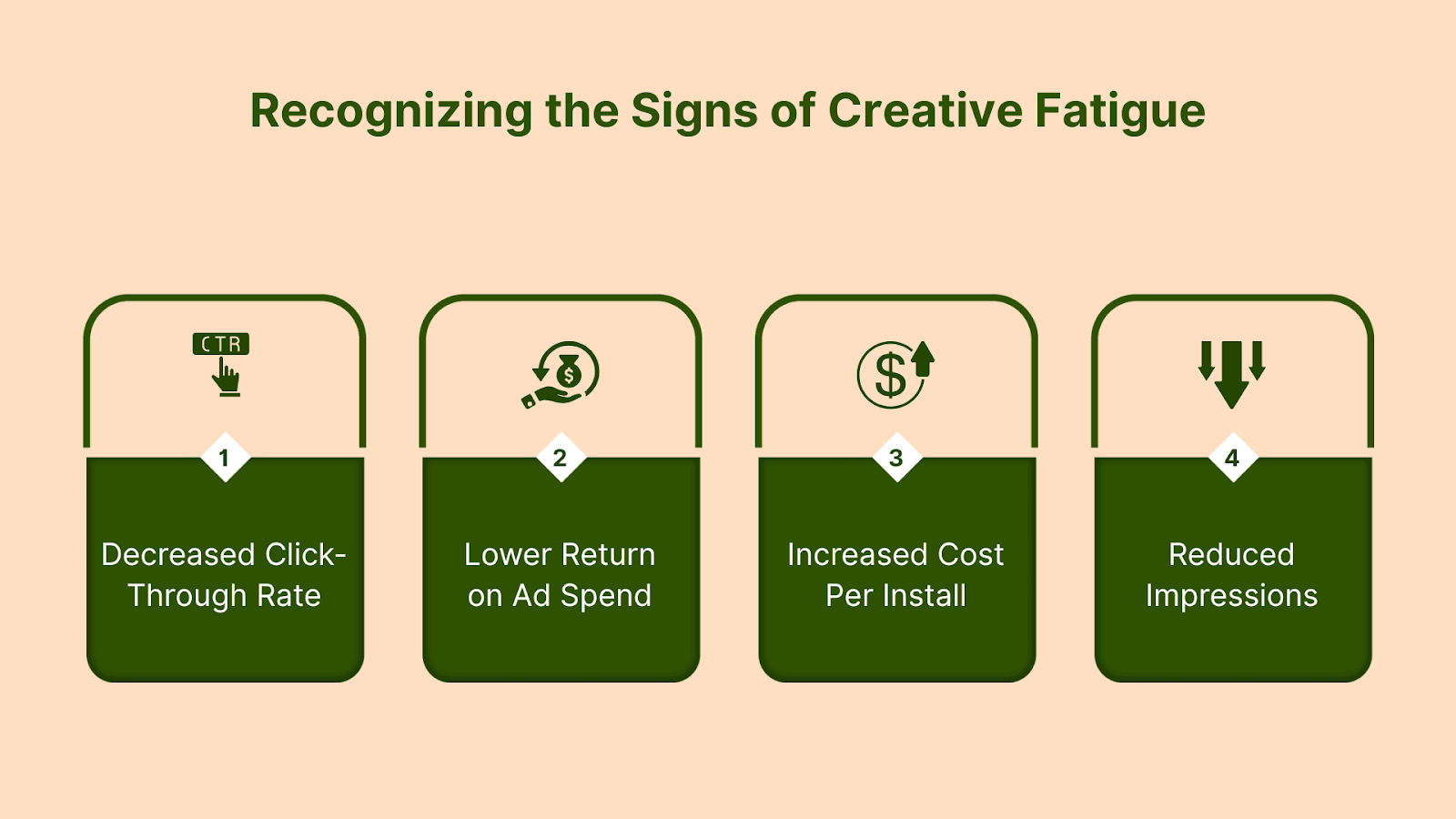
Image Source: Segwise
This is why white label Facebook ads services have become a strategic solution. They provide the structure, monitoring, and production support agencies need to manage fatigue consistently, rather than relying on last-minute fixes.
How White Label Facebook Ads Help Agencies Manage Creative Fatigue?
1. Systematic Fatigue Detection Across Audiences
White label Facebook advertising partners rely on structured analytics frameworks to monitor performance across accounts, campaigns, and audience segments in real time. Instead of reviewing metrics manually or waiting for weekly reports, they track early indicators of creative fatigue at the audience level. These indicators often include gradual engagement decline, rising CPMs, and shifts in relevance rankings that signal reduced user interest.
By centralizing performance data, white label teams can compare how the same creative performs across different audiences and placements. This makes it easier to identify patterns that would otherwise go unnoticed, such as fatigue appearing first in retargeting audiences or specific age groups. Agencies benefit from earlier intervention, allowing them to refresh or rotate creatives before performance drops sharply.
This proactive approach replaces reactive optimization. Rather than fixing issues after results decline, agencies can maintain stable performance over time. PPC benchmark reports suggest that teams using advanced monitoring and alert systems can shorten optimization cycles by up to 30 percent compared to manual reporting workflows, resulting in more consistent outcomes across accounts.
2. Data-Driven Creative Rotation Frameworks
One of the core strengths of white label Facebook ads services is the use of structured creative rotation frameworks. Instead of relying on one-off creative swaps, white label teams build and maintain libraries of pre-tested variations designed for different audiences, formats, and funnel stages.
These frameworks allow agencies to:
- Rotate creatives based on real audience response, not guesswork
- Prioritize variations that maintain engagement over longer periods
- Prevent overexposure within specific segments
By sequencing creatives logically, agencies keep ads fresh while preserving learning signals within the Facebook algorithm. This approach reduces the need to restart campaigns or reset optimization phases, which can disrupt performance. Over time, structured rotation creates a steady rhythm of testing and refinement rather than constant resets.
3. Predictive Modeling for Creative Lifespan
Some white label partners go beyond reactive rotation by using predictive modeling to estimate a creative’s effective lifespan. Historical performance data plays a key role in this process. Metrics such as frequency sensitivity, audience overlap, engagement decay, and past conversion trends help determine how long a creative is likely to remain effective.
With these insights, agencies can plan creative development in advance. Instead of scrambling when performance drops, they schedule refreshes ahead of time and align production timelines with expected fatigue windows. This shift from reaction to anticipation reduces stress on teams and leads to smoother campaign transitions. Predictive planning also helps agencies allocate creative resources more efficiently across clients.
4. Dedicated Creative Production Support
Scaling creative output internally often requires additional hiring, training, and management. White label Facebook ads services eliminate much of this burden by providing access to experienced media buyers, copywriters, designers, and video editors as part of the service.
This support is especially valuable as video continues to dominate performance on Facebook and Instagram. Meta benchmarks consistently show that video ads can outperform static creatives by up to six times in engagement. Producing video at scale often outperform static creatives by up to 6–10× in engagement on Facebook and Instagram, however, requires specialized skills and fast turnaround times. White label teams help agencies maintain a steady flow of high-quality assets without expanding payroll or overloading internal staff.
5. Campaign Structuring for Longevity
Creative fatigue is closely linked to how campaigns are structured. White label experts help agencies design campaigns with longevity in mind by aligning creative strategy with audience intent and funnel stages. Key practices often include:
- Diversifying placements to avoid overexposure
- Managing audience overlap to reduce redundancy
- Sequencing creatives based on where users are in the buying journey
- Matching messaging tone and format to intent
This structured approach reduces fatigue while preserving valuable learning data within the platform. Ads feel more relevant because they evolve alongside the user’s journey rather than repeating the same message across every touchpoint.
6. Clear Reporting That Ties Creative to Results
White labeled reporting connects creative performance directly to business outcomes. Instead of focusing only on surface-level metrics, reports highlight how creative freshness impacts cost per result, engagement trends, and conversion stability over time.
For agencies, this clarity improves client communication. Creative decisions can be explained with data, not assumptions. Clients gain a better understanding of why creative refreshes matter and how they contribute to long-term performance. This transparency builds trust and reinforces the agency’s strategic role rather than positioning creative updates as reactive fixes.
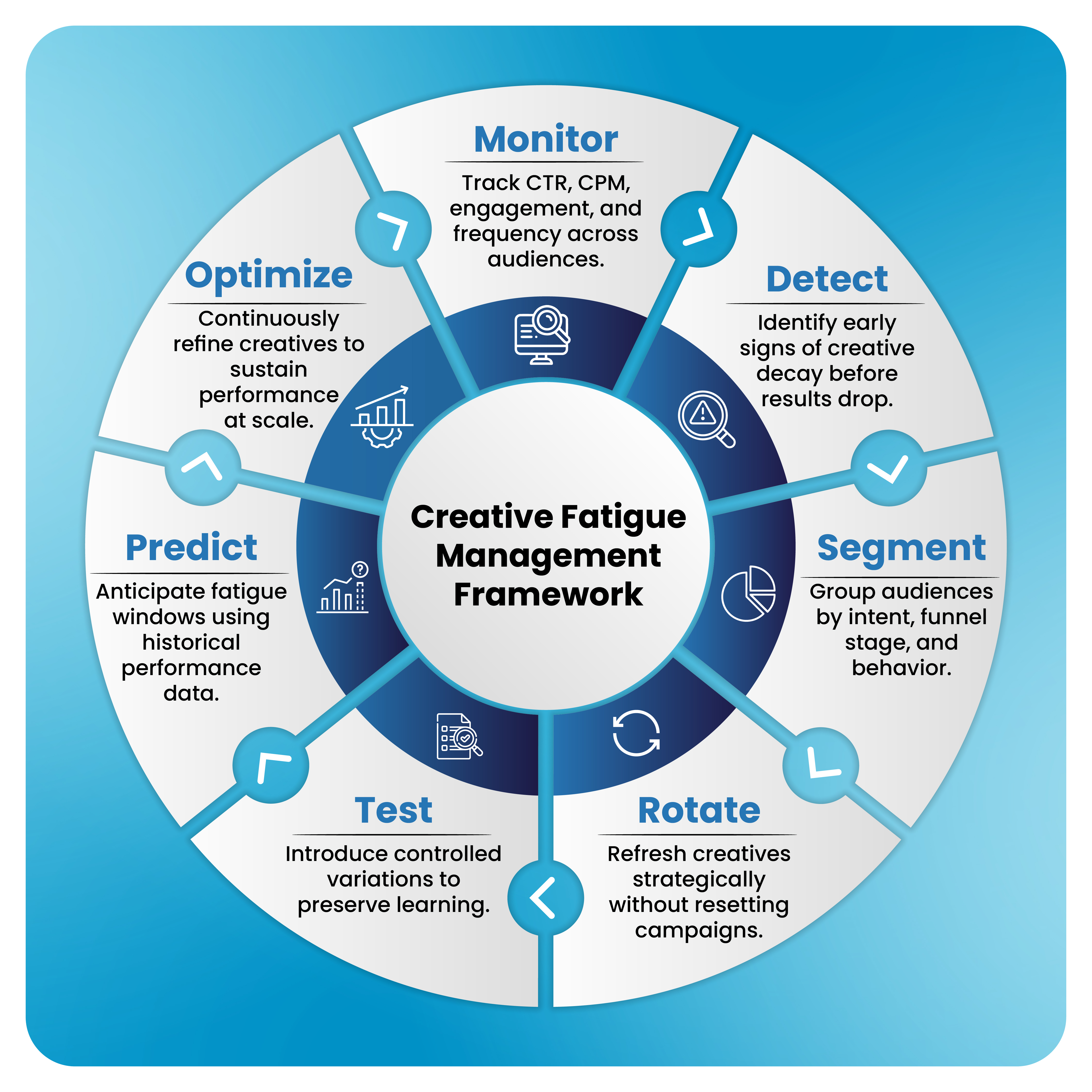
How DashClicks Helps Agencies Manage Creative Fatigue at Scale?
DashClicks offers white label Facebook advertising designed specifically for agencies managing growth at scale. The platform provides access to dedicated media buyers and creative specialists who work under the agency’s brand, ensuring consistency and professionalism.
Their platform supports agencies with structured creative rotation and testing frameworks that reduce audience overexposure. Campaigns are monitored continuously for fatigue signals such as rising CPMs, declining CTRs, and increasing frequency. When early signs appear, creative refreshes are implemented strategically rather than reactively.
Audience-specific optimization is a core strength. Their team ensures that creatives align with different audience segments and funnel stages, helping maintain relevance across campaigns. White-labeled reporting ties creative performance directly to key metrics, making it easier for agencies to explain results and justify decisions to clients.
By handling the operational complexity of Facebook ads services, DashClicks allows agencies to focus on strategy, client relationships, and business growth without overwhelming internal teams.
Conclusion
Creative fatigue is no longer a minor optimization issue. It is one of the main reasons Facebook campaigns plateau or decline as agencies scale. Rising ad costs, fragmented audiences, and limited internal capacity make manual solutions ineffective.
White label Facebook advertising offers agencies a scalable operating model. With systematic fatigue detection, data-driven creative rotation, predictive planning, and dedicated production support, agencies can maintain performance without exhausting their teams.
The agencies that succeed in the coming years will be those that treat creative operations as a system, not a series of last-minute fixes. Leveraging the best white label Facebook ads partners allows agencies to stay ahead of fatigue while delivering consistent results for clients.
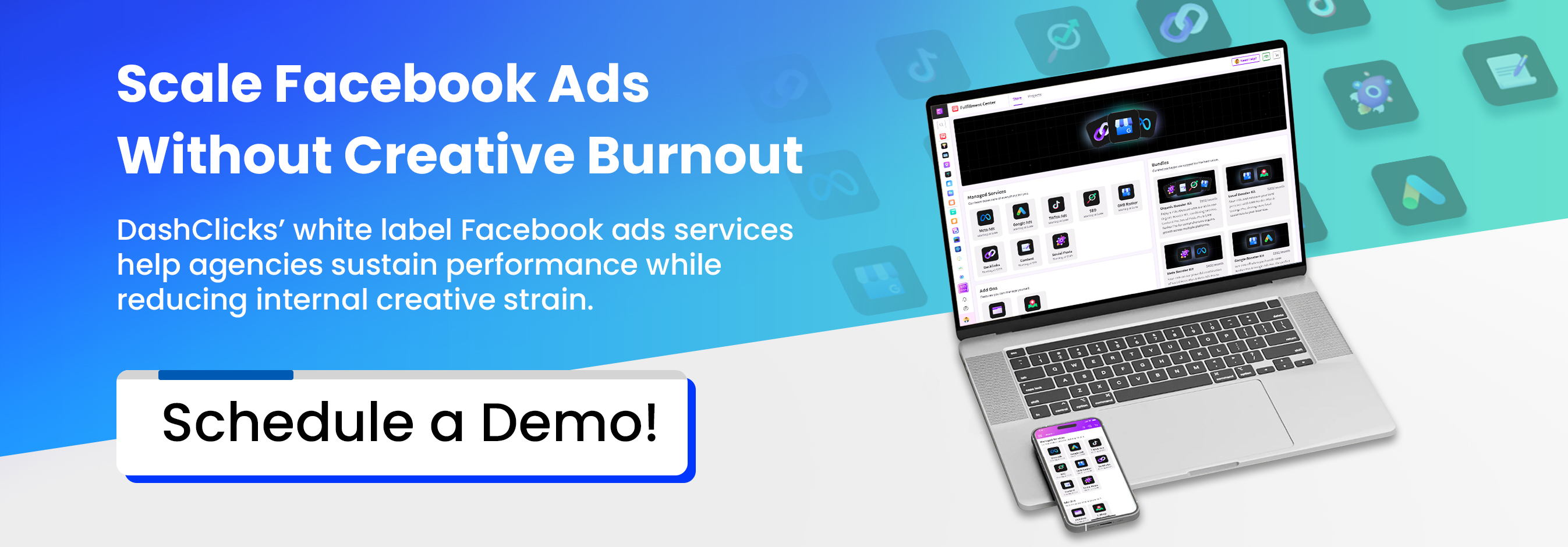

No results found.
Please try different keywords.
Get Started with
DashClicks Today
Get found online, convert leads faster, generate more revenue, and improve your reputation with our all-in-one platform.
.svg)
Unlimited Sub-Accounts
.svg)
Unlimited Users
.svg)
All Apps
.svg)
All Features
.svg)
White-Labeled
.svg)
Active Community
.svg)
Mobile App
.svg)
Live Support
.svg)
100+ Tutorials
.svg)
Unlimited Sub-Accounts
.svg)
Unlimited Users
.svg)
All Apps
.svg)
All Features
.svg)
White-Labeled
.svg)
Active Community
.svg)
Mobile App
.svg)
Live Support
.svg)
100+ Tutorials
.svg)
Unlimited Sub-Accounts
.svg)
Unlimited Users
.svg)
All Apps
.svg)
All Features
.svg)
White-Labeled
.svg)
Active Community
.svg)
Mobile App
.svg)
Live Support
.svg)
100+ Tutorials



.svg)
.svg)
.svg)
.svg)
.svg)


